#and omitting/altering information from episode one
Explore tagged Tumblr posts
Text
This was so serial experiments lain of him. The angel’s choir. The boot up sequence. Those air splitting noises jumping from ear to ear. How dead it all is.Terrifying prospect actually.
#stamp knives is so evil actually#he’s terrifying#the fact it’s specifically the memory world of knives and it’s so damn empty#like this is his head???#no wonder he’s like this#can I compare angels to digital machinery here#something something#angels and transmission lines#something something becoming omnipresent#trigun#millions knives#something something how knives is overlooking and haunting the narrative in Trigun Stampede#and omitting/altering information from episode one#until he can’t and also dead❤️#and I mean the angel’s choir and the idea of Vash’s baptism#could be angels crying too#I know it’s the plants#Spotify
19 notes
·
View notes
Text
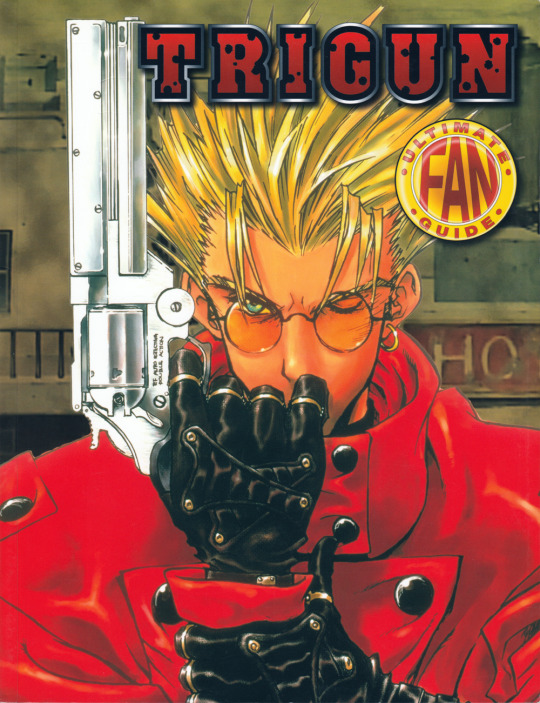
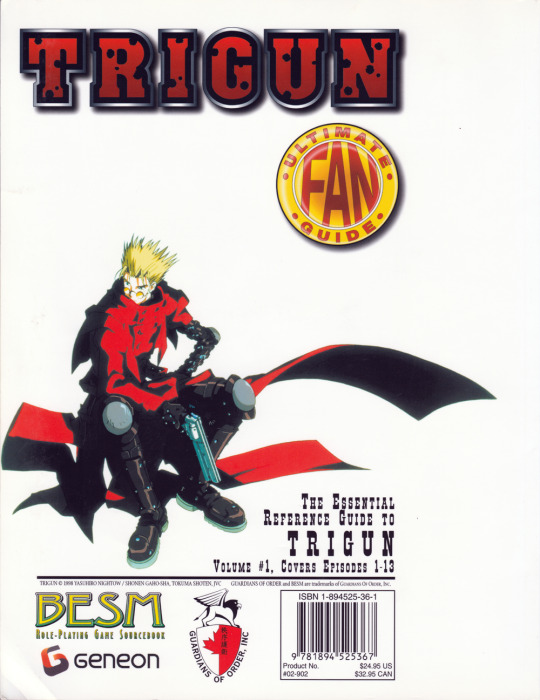

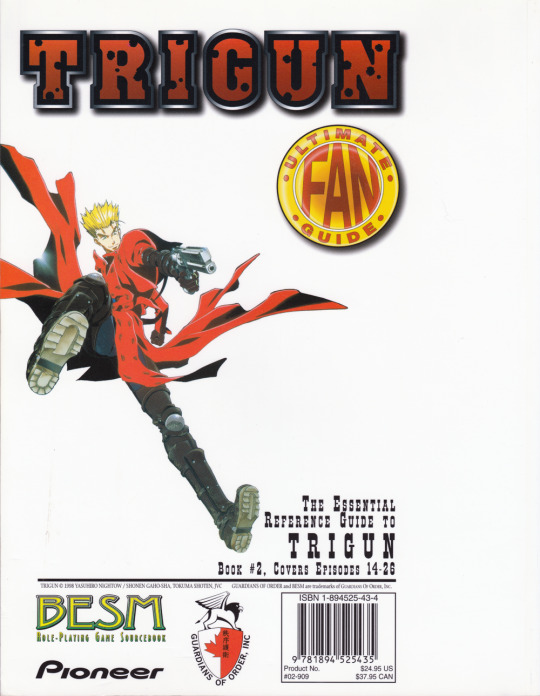
Trigun Ultimate Fan Guide Volume #1 (Geneon second edition, 2004) and Book #2 (Pioneer first edition, 2002) front and back covers.
Scanned by me.
Information and me rambling about the books beneath the cut:
In addition to episode summaries, character bios, and general information about the show, these books contain Trigun-related game materials for the "Big Eyes, Small Mouth" (abbreviated as "BESM") TTRPG system produced by Guardians of Order.
While I've never used them for the game, I've read the show guide portions many times. There are some mistakes by the author but otherwise it's a really nicely done fan guide. The guide section is printed in full color and has TONS of screenshots (albeit low quality) and official artworks. The game portion is black and white and in addition to the game information, there's lots of great quality scans of set materials (larger than the versions in the Roman Album artbook!!). If you're a big fan of the 1998 anime, I definitely recommend picking them up if you get the chance!
I found the copies pictured above for sale together years ago at an anime convention, I think it's interesting how there are actually 2 editions (due to Pioneer becoming Geneon in 2003) and that I managed to end up with one of each version.....
There's also a combined hardcover version of these books called Trigun D20 that was published in 2004 under the Geneon name. I've seen a PDF version of it, I think a few minor things are omitted from the guidebook portions but I have not analyzed them closely enough to be 100% sure. I am also unsure if the game portion is altered due to it being advertised for the D20 system on the cover, but there's still a mention of BESM on the back. honestly I know nothing about TTRPGs so I really have no idea what any of this really means lmao
#trigun#trigun 98#trigun 1998#scans#my scans#vash the stampede#nicholas d. wolfwood#ultimate fan guide#besm#big eyes small mouth#guardians of order#yes these are officially licensed#i like how the design of vol.1 cover says HO next to vash lol
62 notes
·
View notes
Text
If Jason wanted to convince me that Lxa was the love of Clarke's life, he wouldn't have killed her off, effectively cutting their love story permanently, with 4.5 seasons left of the show. Their arc, starting with their introduction in 2x07 and concluding with L's death in 3x07, is 17 episodes long, accounting for 17% of the entire narrative. If I generously add 3x16 to the count, an episode in which L is already dead in the corporeal world Clarke is trying to return to, it's a whopping, grand total of 18%. An 18% congruous with Clarke's intense connection to Bellamy and vice versa, which even A.lycia confirmed as romantic. Feelings romantic enough to spur the formation of a love triangle. An 18% ignoring Clarke's ultimate choice to go back to her people when L wanted her to stay.
CL is a chapter in the story begun and wrapped up in the first half of the narrative. And that's omitting further illumination on the finer details making CL so problematic for Clarke. Do you expect me to believe it was coincidental for CL to occur at a time when Clarke was spiraling down a dark path, commencing with Finn's death? Who played a hand in forcing Clarke's own hand, with Finn, and TonDC, and Mount Weather? Whose example inspired her to ensnare herself in armor and warpaint to be strong enough to save her people? Whose behavior did she emulate in the pushing away of support from her people? Who gave her a place to continue hiding from Bellamy, her mom, and her friends? A place to be someone other than Clarke Griffin? In lieu of facing her fears like the heroine she is? The purpose of CL wasn't to provide Clarke with a magnificent, fairy tale romance gone tragically wrong. I believe Jason's intent with the relationship aimed to further damage Clarke's psyche after L's death, to solidify the belief that her love is not only deadly to its recipients but renders her too weak to do what must be done for survival.
After 3x16, CL is an often superfluous namedrop or two per season for Clarke to briefly react to before carrying on with the plot. Season 5 aside, most of these references are needless enough to be able to interpret them as attempts at reparations for the L/CL fandom's benefit -and their views- without altering the course of the story. Crazy me for thinking it's not enough to constitute an ongoing love story. Crazy me for not thinking this was on par with interactions between living characters. Crazy me for thinking it doesn't befit a love story for the protagonist.
This sliver of the story is what Jason and the CLs would have us unquestionably believe is the pervasive love story of The 100's seven seasons?
Despite his lie and the constant gaslighting from the pineapple CLs, some of us know how to decipher what a temporary love interest is. Lxa? I think you know where I'm heading with this.
I'll acknowledge my admittedly negative appraisal of CL as someone who recognizes its value to the LGBT+ community and treats it as valid while not caring for L/CL on a narrative level. I felt, when swayed by L's influence, Clarke became the antithesis of what I found admirable about her. I resented Clarke's acquiescence of her power to the commander. I wanted nothing more than to remove the wedge L had driven between Clarke and Bellamy.
Let me try to give L/CL the benefit of the doubt for a minute. I don't hold L as responsible for Clarke's choices, but I recognize the prominent role she played in their upbringing. The push and pull was an intriguing aspect of their dynamic, as was the chance to meet a manifestation of who Clarke might have been if she was all head, no heart. Her fall from grace was arguably necessary for her to be a fully-rounded character, not a Mary Sue. It wouldn't be realistic for the protagonist of a tragic story about a brutal world to be a pure cinnamon roll. When forgiveness is an innate theme with Clarke, it would be my bias at work if I was content with her applying it to everyone but Lxa. Clarke saw enough commonalities between her and L to identify with the latter. When she extended forgiveness to L, I believe it was her way of taking the first step on the path to making peace with herself by proxy. None of this means I wanted them paired up. At best, I made my peace with seeing the relationship through to its eventual end. In time for L's death, ironically. My passivity about them notwithstanding, my conclusions are, however, supported by canon.
If I may submit a Doylist reason for romantic CL? Jason knew he had a massive subfandom itching to see them coupled, thereby boosting ratings and generating media buzz. A Watsonian reason? Without relevance, I think L would have been another Anya to Clarke. Grapple shortly with the unfair taking of a life right as they choose to steer towards unity, melancholy giving way to the inconvenience of the loss of a potential, powerful political ally. Romance ensured her arc with L would have the designated impact on Clarke's character moving forward in the next act.
For a show not about relationships, Jason has routinely used romantic love as a shorthand for character and dynamic development. It's happened with so many hastily strung together pairings. And when it does, everyone and their mother bends over backward to defend the relationship. It's romantic because it just is. Didn't you see the kissing? Romantic.
No, The 100 at its core is not about relationships, romantic and otherwise. But stack the number of fans invested exclusively by the action against those of us appreciating a strong plot but are emotionally attached to the characters and dynamics. Who do we think wins? Jason can cry all he wants over an audience refusing to be dazzled solely by his flashy sci-fi.
Funnily enough, "not about relationships'' is only ever applied to Bellarke. Bellarke, a relationship so consistently significant, it's the central dynamic of the show. The backbone on which the story is predicated. Only with Bellarke does it become super imperative to represent male-female platonic relationships. As if Bellarke is the end all, be all of platonic friendship representation on this show. In every single television show in the history of television shows.
Where was this advocacy when B/echo was foisted upon on us after one scene between them where he didn't outright hate Echo? When one interaction before that, he nearly choked the life out of her. If male-female friendship on TV is so sparse, why didn't B/ravens celebrate the familial relationship between Bellamy and Raven? Isn't the fact that they interpret Clarke as abusive to Bellamy all the more reason to praise his oh-so-healthy friendship with Raven as friendship? They might be the one group of shippers at the least liberty to use this argument against Bellarke, lest they want to hear the cacophony of our fandom's laughter at the sheer hypocrisy of the joke. Instead, they've held on with an iron grip to the one sex scene from practically three lifetimes ago when the characters were distracting themselves from their feelings on OTHER people? They've recalled this as "proof" of romance while silent on (or misconstruing) the 99% of narrative wherein they were platonic and the 100% of the time they were canonically non-romantic.
Bellarke is only non-romantic if you believe love stories are told in the space of time it takes for Characters A & B to make out and screw each other onscreen, a timespan amounting to less than the intermission of a quick bathroom break. If it sounds ridiculous, it's because it is. And yet, some can't wrap their heads around the idea that maybe, just maybe, a well-written love story in its entirety is denoted by more than two insubstantial markers and unreliable qualifiers. B/raven had sex, and the deed didn't fashion them into a romance. Jasper and Maya kissed but didn't have sex. Were they half a romantic relationship? Bellarke is paralleled to romantic couples all the time, but it counts for nothing in the eyes of their rival-ship fandom adversaries. Take ship wars out of it by considering Mackson. Like B/echo, the show informed us that Mackson became a couple post-Praimfaya, offscreen, via a kiss. Does anyone fancy them an epic love story with their whisper of a buildup? Since a kiss is all it takes, as dictated by fandom parameters, we should.
If Characters A & B are ensconced in a romantic storyline, then by definition, their relationship is neither non-romantic nor fanon. "Platonic" rings hollow as a descriptor for feelings canonically not so.
If the rest of the fandom doesn't want to take our word for granted, Bob confirmed Bellarke as romantic. Is he as delusional as we are? Bob is not a shipper, but he knows what he was told to perform and how. Why do the pineapples twist themselves in knots to discredit his word? If they are so assured by Jason's word-of-god affirmation, then what credibility does it bear to have Bellarke validated by someone other than the one in charge? They're so quick to aggressively repudiate any statement less than "CL is everything. Nothing else exists. CL is the only fictional love story in The 100, nay, the WORLD. CL is the single greatest man-made invention since the advent of the wheel."
We've all seen a show with a romantic relationship between the leads at the core of the story. We all know the definition of slowburn. We can pinpoint the tropes used to convey romantic feelings. We know conflict is how stories are told. We know when interferences are meant to separate them. We know when obstacles are overcome, they're stronger for it. We know that's why the hurdles exist. We know those impediments often take the shape of interim, third-party love interests. We know what love triangles are. We know pining and longing.
Jason wasn't revolutionary in his structure of Bellarke. He wasn't sly. Jason modeled them no differently than most other shows do with their main romances. Subtler and slower, sure. Sometimes not subtle at all. There's no subtlety in having Clarke viscerally react to multiple shots of Bellamy with his girlfriend. No subtlety in him prioritizing her life over the others in Sanctum's clutches. In her prioritizing his life above all the other lives she was sure would perish if he opened the bunker door. There is no subtlety in Bellamy poisoning his sister to stave off Clarke's impending execution. In her relinquishing 50 Arkadian lives for him after it killed her to choose only 100 to preserve. In her sending the daughter Clarke was hellbent to protect, into the trenches to save him. In him marching across enemy lines to rescue her. In her surrender to her kidnapper to march to potential death, to prevent Bellamy's immediate one. No subtlety in Josie's callouts. No subtlety in Lxa's successful use of his name to convince Clarke to let a bomb drop on an unsuspecting village. Bet every dollar you have that the list goes on and on.
There are a lot of layers to what this show was. It was a tragedy, with hope for light at the end of the tunnel. It was, first and foremost, a post-apocalyptic sci-fi survival drama. Within this overarch is the story of how the union of Clarke Griffin and Bellamy Blake saves humanity, ushering in an age of peace. In this regard, their relationship transcended romance. But with the two of them growing exponentially more intimate each season, pulled apart by obstacles only to draw closer once again, theirs was a love story. A romantic opus, the crescendo timed in such a way that the resolution of this storyline -the moment they get together- would align with the resolution of the main plot. Tying Bellarke to the completion of this tale made them more meaningful than any other relationship on this show, not less.
Whereas the trend with every other pair was to chronicle whether they survived this hostile world intact or succumbed to it, Bellarke was a slowburn. A unique appellation for the couples on this show, but not disqualifying them from romantic acknowledgment.
Framing Bellarke in this manner was 100% Jason's choice. If he wanted the audience to treat them as platonic, he should have made it clear within the narrative itself, not through vague, word-of-god dispatches. A mishandled 180-degree swerve at the clutch as a consequence of extra-textual factors doesn't negate the 84% of the story prior. It's just bad writing to not follow through. And Jason's poor, nearsighted decisions ruined a hell of a lot more than a Bellarke endgame.
The problem is, when Bellarke is legitimized, the pineapples are yanked out of their fantasies where they get to pretend the quoted exaggerations above are real. Here I'm embellishing, but some of them have deeply ingrained their identities in CL to the degree where hyperbole is rechristened to incontestable facts. An endorsement for Bellarke is an obtrusive reminder of the not all-encompassing reception of their ship. A lack of positive sentiment is an attack on their OTP, elevated to an attack on their identity. Before long, it ascends to an alleged offense to their right to exist. The perpetrators of this evil against humanity are the enemy, and they must attack in kind, in defense of themselves.
Truthfully, I think it's sad, the connotation of human happiness wholly dependent on the outcome of a fictional liaison already terminated years ago. I'm not unaware of the marginalization of minorities, of the LGBT+ community, in media. I haven't buried my head in the sand to pretend there aren't horrible crimes committed against them. I don't pretend prejudice isn't rampant. When defense and education devolve into hatred and libel for asinine reasons, though, the line has been crossed. You don't get a free pass to hurt someone with your words over a damn ship war. No matter how hard you try to dress it up as righteous social justice, I assure you, you're woefully transparent.
#my thoughts#thoughts i wanted off my chest#don't mind me#i'm trying to keep this out of the main tags#la dee da#ok here we go#bellarke#anti jroth#the 100#cl#the 100 ships#long post#fandom wank#sorta#if you read all this#you're a real trooper#i salute you#anticlexa#antibecho#antibraven#late night rambling#an autobiography#my post
254 notes
·
View notes
Text

They grew to gain their semblances. This matters indefinitely because it can’t definitely alter how the character can be perceived. As you mentioned, the personality can be defined by experiences. How I perceive it is that the Branwen tribe is known for being murderous bandits meaning they aren’t inherently good people. Emotional abuse could likely inform the personality and thus the semblance. In a setting where strength is needed for survival, emotions are likely~
Considered a weakness and thus showing them could lead to potential emotional abuse. If one is constantly berated and treated like they can’t do anything right, they develope later on to believe that to be fact, that they can’t do anything right and they will always screw up. Now imagine having a semblance informed around that. A semblance that often messes everything up for the user and everyone around them. Sounds a lot like what Qrow has. Vol. 4-6 is great at~
At portraying Qrow constantly berating himself. He might do good things but he still feels like he is a burden. He very clearly has self esteem issues. Now the potential backstory isn’t confirmed canon, but it goes to show that there are other possible explanations as to why a semblance might take a form and that it might not be the best to settle on one specific concept especially when it’s acknowledged that the potential concept is contradictory.
I think this is going to be a case of agree-to-disagree, but I’d like to answer all the same.
I would like to mention as this was not addressed in the blog, Semblances can evolve.
For the record, I have talked about it before—in this post, to be exact—but I haven’t really gone into overly great depth on the topic. And you’re right, I didn’t mention it here.
The reason why I didn’t is because [1] it wasn’t inherently relevant to the initial question, and [2] because I think the idea of Semblances “evolving” is dumb. Sorry for the bluntness. But really, I loathe its inclusion in the canon. And I am eternally baffled by the mental gymnastics that the fandom does to justify plotholes, by wielding Semblance evolution as a criticism-proof shield.
As far as I can tell, the idea is very much a late-game addition to the show apropos of nothing. There’s either no evidence for its existence prior to V7; or, very flaky, unsubstantial evidence based on subjective, personal interpretations.
For example, nowhere in World of Remnant, V2.E4 - “Aura” is the idea of Semblance evolution mentioned. And given that this is the episode that defines what Semblances are, it’s a little weird that the transcript doesn’t talk about this “integral” concept.
To make my point even more salient, Miles Luna states in the V2 commentary that the entire premise of World of Remnant is to clarify its worldbuilding and lore:
Miles Luna: We have the World of Remnant videos to kinda get, uh, some exposition across as best as we could.
Let’s not mince words here: Either this means that Semblance evolution (something that’s allegedly important to the show) was somehow omitted from the mini series whose sole purpose is to convey its lore (which means that the people writing the show suck at their job).
Or,
it means that Semblance evolution was a last-second addition to the show, and its inclusion ultimately causes more problems than it fixes because it muddies the established canon.
It also doesn’t help that as the series progressed, and we watched characters have conversations about Semblances, they didn’t mention it either. When Winter is talking to Weiss about their Semblances in V3.E4, we get this exchange:
Winter: We Schnees are unique. Unlike many, our Semblance is hereditary. But that doesn't mean it will come easily. Your Semblance is like a muscle. The more you practice with it, the stronger it will become. But if you only focus on one aspect of it—if you fail to test the limits of what you think is possible—then you'll never truly grow.
When I first saw this episode, I took Winter’s analogy to be fairly literal. Let’s say, for example, I worked out my leg muscles every day by long jumping. If I keep practicing, my jumping ability isn’t going to evolve into jump-propelled flight. I’m just going to get more efficient at long jumping (the thing I was already capable of doing), and I’ll be able to cover greater distances with each leap.
Let’s extend the analogy to Glyphs. Weiss, who initially struggled to use her Semblance, is currently limited to summoning one Grimm at a time.
By contrast, her older sister, who is clearly more experienced, can summon multiple Grimm at once.

Winter summoning multiple Beowolves in a sparring match with Weiss. | Source: RWBY Wiki contributor user:ChishioKunrin.

Winter summoning a flock of Nevermores in her duel with Qrow. | Source: RWBY Wiki contributor user:ChishioKunrin.
This was my takeaway from that scene—that as Weiss practices, she’ll not only get faster at summoning, but she’ll be able to summon several at a time. The same goes for other characters: that as they practice their Semblances, their powers aren’t going to change into something tangentially related or altogether new. Rather, the characters would get more proficient at their skill, and demonstrate their mastery through refinement.
Ruby, whose Semblance was originally superspeed, wouldn’t get that weird quantum mechanics bullshit from later volumes. Instead, she would have demonstrated her mastery over her Semblance by smoothing out any kinks that she initially struggled with—like braking suddenly, or turning on a dime, or weaving between tightly-packed obstacles without losing velocity. Things that would make sense for her to struggle with based on the premise of her Semblance.
For comparison, look at how Avatar: The Last Airbender demonstrates proficiency with its characters. Katara’s waterbending doesn’t “evolve” into something different. Instead, we watch her struggle from the onset at manipulating water and doing something as basic as creating a wave. By the end of the series, she learns how to do the following:
Manipulating water vapor in the air to reshape clouds.
Freely transitioning her element between a liquid water state and a solid ice state.
Shaping water into tendrils or whips.
Harnessing the water in living tissue to control people.
Extracting water from unconventional sources, like plants.
Creating platforms of ice to surf upon by manipulating the surrounding water.
Freezing water into sharp projectiles and firing them at opponents.
These are all believable skills that Katara could learn, based on the conventions of her powers. The show doesn’t change her bending, or make the element she bends something other than water. It stays the same. All of the things that I listed involve manipulating water, the fundamental basis of her power.
What changes is how she waterbends, and how skilled she is at doing so.
These are also powers that we see other adept benders use—like Hama bloodbending, and Huu controlling vines—which only reinforces the image of what mastery looks like among waterbenders.
Consistency and clarity of lore are what make stories with superpowers work. Something which RWBY lacks, as evidenced by the quote from Miles, and the out-of-nowhere introduction of Semblance evolution.
Besides, what would Semblance evolution even look like for Weiss? Her glyphs were already a ridiculously-overpowered Swiss army knife of miscellaneous skills, like summoning, shielding, and Dust manipulation. Giving her even more powers on top of those would make her Semblance even more broken than it already is.
In the interest of having mercy on my followers’ dashboards, the rest is going under a readmore.
The characters you’re using as an example aren’t exactly the best because, more specifically Qrow and James, we have no clue how as characters they grew to gain their semblances.
On the contrary, I’d argue that James is a good example because it doesn’t matter what his backstory is. It literally doesn’t matter what excuse the show provides to explain why James acquired Mettle as his Semblance. What matters is that they coded a disabled character as autistic and then used his autistic-coded trait to justify turning him into an irredeemable antagonist who commits genocide. No in-universe explanation can undo the real-world harm that their writing decisions caused.
And even after multiple fans approached the company and said, “Hey, you might not have intended for this to be the case, but your disabled neurodivergent-coded character depicts a marginalized community in a harmful way, and is leaning into extremely negative stereotypes,” the writers shrugged them off and stood by their decision.
Fiction doesn’t exist in a vacuum.
As far as I’m concerned, the writers could come up with the world’s best alibi for James’ Semblance, and I still wouldn’t condone it. Because at this point, Rooster Teeth has a consistent track record when it comes to depicting minorities and marginalized groups. Penny, who is autistic-coded, has now been killed twice—the first time she was sliced in half on live television, and the second time she was “mercy killed” shortly after her disability (being a synthetic person) was “cured.”
If Rooster Teeth really wanted to have a ND-coded antagonist, then it needed to (at the barest minimum) have a large number of ND-coded protagonists.
Clyde does a great job explaining why here, when she talks about Ilia being the series’ first openly-queer character.
Let’s start with the acknowledgment that yes, no matter who Rooster Teeth chose as their first LBGTQIA character, some people were going to be disappointed. Either because the choice doesn’t fit their ship or because of the dichotomy we’re seeing now: the Good vs. Evil gay character divide. It’s a simple disagreement on the surface that nevertheless houses a lot of important questions and concerns: should you make your gay character one of the Good Guys in order provide positive representation, or should you make them one of the Bad Guys in order to provide diverse representation? Do you send the message that being gay is wonderful by associating it with the heroes, or something that’s natural by associating it with the villains - making a statement that anyone can be LGBTQIA, not just the ones you’re rooting for?
The answer to this dilemma is that you do both. You provide variety in order to likewise provide true, diverse representation. However, the reality is that we haven’t reached a point in most media where you get lots and lots of gay characters to provide lots and lots of diversity… so therefore I feel rather strongly that the first character should be a positive portrayal.
Why? Because we’re not living in a positive world. Because we’re still a part of societies where LGBTQIA people are ridiculed, discriminated, and murdered. Because the idea that it’s not just okay, but fantastic to be gay is FAR from universal.
(Emphasis mine.)
Swap out queer with neurodivergent and it’s the same principle. So far, the show has had no explicitly confirmed characters that are ND. Which means that the representation we’ve gotten so far is [1] coding, and [2] offensive and harmful.
James’ Semblance is therefore a good example of my initial point, because my initial point was this is bad writing, and we deserve better.
As you mentioned, the personality can be defined by experiences. How I perceive it is that the Branwen tribe is known for being murderous bandits meaning they aren’t inherently good people. Emotional abuse could likely inform the personality and thus the semblance.
Just to be clear—your argument is that Qrow’s Semblance, Misfortune, does represent his personality, because his personality was shaped by his traumatic, abusive childhood environment.
And just to reiterate, a personality-based Semblance is a reflection of an immutable part of your core identity.
And in Qrow’s case, that core part of his identity is his trauma. Something that is permanent, destructive, and only capable of causing him inconvenience or harm.
Yeah, no. I’m sorry, but I can’t agree with that. If that is in fact intentional on the writers’ part (and that’s a pretty big if, given that the writing is deliberately vague), then what that means is they were comfortable conflating a person’s abuse with their personality.
You grew up in a toxic environment? Too bad. Your superpower is now weaponized trauma. Have fun going to therapy! It totally won’t do you any good because Semblances can’t change. Enjoy being reminded of your trauma for the rest of your life every time your Semblance nearly kills one of your nieces!
I’m saying this as someone who did grow up in a toxic, traumatic, abusive home environment. By the time I was 15, I had anxiety, depression, an eating disorder, and suicidal ideation because of my manipulative, gaslighting, drug-addict, alcoholic, physically-violent father.
Imagine how 15-year-old me would have reacted had I been watching RWBY at the time, and was told that Qrow’s personality was permanently shaped by his childhood trauma. And that no matter what Qrow did, no matter how much he tried to heal, he could never escape it.
That doesn’t exactly make for a good message to your audience, now does it?
And in case it bears repeating, this is the sort of upbringing that Qrow was subjected to on a daily basis:

The destruction of Shion. | Source: RWBY Wiki contributor user:ChishioKunrin.
From World of Remnant, Volume 4, Episode 5: “Between Kingdoms.”
“Unfortunately, it's not just the Grimm runnin' around ruining towns. Wandering bandits are another threat. These groups of usually fairly-skilled fighters travel the lands, never settling in one place. They often prey on convoys sending goods between kingdoms.
That's not all. These raiders will often wait for a town to be at its weakest—maybe after a Grimm attack or while its fighters are out hunting—before finally moving in at night and striking.
And you can't exactly have bandits raid your town without at least a few negative emotions. This is also why bandits never stay in the towns they conquer. With attitudes like the ones they have, Grimm tend to be pretty interested in them as well.”
From Volume 4, Episode 4: “Family.”
Raven: You're the one who left. The tribe raised us, and you turned your back on them.
Qrow: They were killers and thieves.
Raven: They were your family.
Qrow: You have a very skewed perception of that word.
Raven: I lead our people now. And as leader, I will do everything in my power to ensure our survival.
Qrow: I saw. The people of Shion saw, too.
Raven: The weak die, the strong live. Those are the rules.
And from Volume 5, Episode 3: “Unforeseen Complications.”
Vernal: Straight to the point. I like it. We don't normally deal in trafficking people—not really worth our time. But, once we realized we had a Schnee, that changed.
To summarize:
The Branwen Tribe was under 24/7 threat of Grimm attack.
They ambushed supply convoys and stole resources.
They raided villages and killed the people living there.
They at least sometimes engaged in human trafficking.
And those are just the things that we’re aware of.
Even if the worldbuilding managed to “justify” Qrow’s Semblance, that doesn’t make the takeaway any less uncomfortable. You have to look beyond the lore and in-world premise, and focus on the ramifications and greater impact that message can have on the audience.
For me, the potential to cause real harm, to real people, is more important than giving a fictional character a bad luck superpower, and using his trauma to justify it. Especially when that superpower (and by association, the inciting trauma) are permanent.
If the show absolutely had to have Qrow’s Semblance be shaped by his upbringing, then it should have made it possible for Semblances to change. That way, as Qrow heals, his Semblance reflects his recovery, and embodies the progress he’s made.
As I said at the beginning, this is going to have to be a case of agree-to-disagree. For my own peace of mind—and in the interest of not getting into an argument—this will be the first, and last, time I reply to this particular topic.
TL;DR - If personality = Semblance, and Qrow’s traumatic childhood = Semblance, then his personality = his trauma.
People are not their trauma.
#asks#texasthegreatdestroyer#i speak#weiss schnee#winter schnee#qrow branwen#james ironwood#semblances#tw: ableism#tw: mental illness#representation#please for the love of god someone ask me something lighthearted#i need a beer#and i don't even drink#readmore#just to clarify that yes. trauma can have a permanent bearing on a person's identity#but people should not be largely or solely defined by it
14 notes
·
View notes
Note
I have just discovered some Finnish dramas on Netflix, and it’s nice that the subtitles reflect more of what’s being said (as opposed to being dubbed), but would you have any idea why not all dialogue is subtitled…?
Ah that's another thing I've noticed with Finnish shows and subtitling/captioning!
The ones that come to mind immediately are Sorjonen (English-language title: Bordertown) and a little web series called Luottomies (Wingman). From what I can catch if I watch either with English subtitles, yeah, whatever is expressed in Finnish tends to be expressed in English subtitles as well.
I haven't watched Sorjonen with Finnish subtitles/captions yet, but Luottomies does have the patterns I've noticed of the subtitles/captions not reflecting what's actually being said. We would watch certain episodes for my class and do activities with them; one of the things I usually did was to find a little section of dialogue and listen to it over and over again so I could record in writing the subtitle/caption, the translation, and then what was actually said. Here's one I did:
Tekstitykset (Subtitles):
Myyjä: Hei! Mitä sais olla? (Seller: Hi! What'll [it] be?) Tommi: Hei. Synttärikakku nimellä Mäkinen-Renwall. (Tommi: Hi. Birthday cake for [name] Mäkinen-Renwall.) Myyjä: Hetkinen. (Seller: Just a moment.)
Puhuttu (Spoken):
Myyjä: Hei. Mitä se teille sais olla? (Seller: Hi. What'll it be for you?) Tommi: Hei! Eeh Mäkinen-Renwall nimellä synttärikakku. (Tommi: Hi! Er, [name] Mäkinen-Renwall has a birthday cake.*) Myyjä: Hetki pien’. (Seller: One moment.)
*The re-arranged word order works in Finnish but not in English, so this is my next-best approximation for English, albeit a tad awkward.
It's not like the dialogue would have made the subtitles/captions too long, there's minimal difference between the two sets.
I honestly don't know why these alterations are made. I don't understand why what's actually spoken wouldn't be rendered in writing verbatim, especially if there is plenty of space and/or timing in the frames and scenes to do so. I can't make sense of it.
I've noticed this too in the film Amélie (which I mentioned in another answer). There's one scene where she's in a cinema watching a film, and she says a couple of things that stand out:
English Subtitle: I like noticing little details that no one else sees. Spoken French: Puis j'aime bien repérer le petit détail que personne ne verra jamais. Closer Translation: And I really like to spot the little detail(s) that no one will ever see.
English Subtitle: But I hate it in old movies when drivers don't watch the road. Spoken French: Par contre j'aime pas dans les vieux films américains quand les conducteurs regardent pas la route. Closer Translation: However, I don't like [it] in old American films when [the] drivers don't watch/look at the road.
Here too I don't understand the discrepancies. The second quote is actually what got me to start paying attention to dialogue vs subtitles years ago. It irked me so much because English and French have a lot in common, and can take up very similar amounts of space and timing in film. Some things don't directly translate between the two, but more things do than I think many people generally realise. The English translations have stood out as misrepresentative and skewed to me since. There was no reason to omit words, intensify the emotions, or create nuance where there needn't be any.
The last one I can think of is the Swedish-Danish series Bron/Broen (The Bridge), and it happens a lot in this that entire lines of dialogue just aren't subtitled/captioned/translated. I can't remember the specific episode I'm thinking of right now, but I still haven't been able to get the missing dialogue. Pretty sure it was Swedish and Danish dialogue too.
I don't know if the dialogue was deemed 'unimportant' for some reason and intentionally left out, if it maybe was included but there was a technology issue that caused it to go missing and it hasn't been fixed, if something else happened that I don't know...I don't know. But it drives me mad whenever I rewatch the series. Characters are clearly reacting to the dialogue at times, but my audio processing and grasp of Swedish and (especially) Danish aren't strong enough to catch it yet.
I think the only kind of explanation I've been able to form is that it may be an autistic/non-autistic thing, or more broadly an ND/'NT' thing. I know that my being ND and particularly autistic influences how I view language and translation, and why I'm a firm supporter of the most verbatim translations possible. I want to know the base information so that I can analyse, interpret, and infer on my own.
Too many of the subtitles/captions/translations I see, though, look like someone else's interpretation of dialogue. Sometimes this can help if there are unspoken things that need to be coded into words a certain way in order to work across languages. Interpreting and translating objectively from a sociocultural framework makes perfect sense. But usually I just end up with more work to do to identify and remove a bias. I have to shift to the source language and sometimes learn enough of that in order to translate on my own, and/or just understand the dialogue in that language and bypass needing a translation entirely.
Maybe many non-autistics and 'NTs' are fine with another's interpretation as their guide. Maybe they don't even think about it or realise, especially if they're adding their own interpretations and inferences onto it, making things more and more indirect. I don't know.
But that's the most I've been able to suspect. Otherwise, subtitles/captions/translations that do not match dialogue seem a bit shoddy to me.
#I...hope this answered your question enough?#went down a rabbit hole#because I notice these things so often#ask me I answer#just language things#oh man I am rusty on my french listening#it can also ruin my connection to a character#I don't want someone deciding 'Oh this is what they actually mean'#and making THAT the 'translation'#despite what they said#let them speak for themselves#people use language idiosyncratically#don't take that away
3 notes
·
View notes
Text
Authoritarianism Without Leadership and the Formation of Spatial Identity
I think at this point I have probably brought this up in every single one of my analyses, so it’s about time that this topic gets its own breakdown in a full length post (or 2 or 3). There’s a lot to cover and it’s going to get way out there, but hopefully you can find something useful here. And if not, maybe it can at least be entertaining. More exploration of this topic to come at an unspecified time after the convention when my brain decides to enter the No.6 zone again. (and yes it is over 3000 words so, you know, plan for that)
So if you couldn’t tell, the No.6 anime does not have an antagonist, at least not in any traditional sense of the word. The opponent our characters are facing off against, it turns out, is not an evil scientist or an organization or a military, but instead it is the city and its systems that must be either destroyed or reformed by the end of the story. And while those other characters exist within the world of No.6, and all take actions that go directly against the desires of our main characters, they are not fought against especially directly and within the anime have no real identity, instead only existing as part of the whole. But what is the whole exactly? I think the easy answer here is to say that the whole is society, the culture we live within that shapes everything we do in life and that must have some amount of force placed upon it to change in any significant way. But when we say that “society is the whole”, and therefore the antagonist of No.6, what do we mean by that? And how does our perception and interpretation of what it means to be a society impact how we read and understand the story of No.6?
Now, having society be the antagonist of a young adult dystopian series is not something that No.6 came up with, obviously. It's basically a necessity of the genre. But within that structure, although not always apparent at first, there is a lot of variance. These worlds are almost always authoritarian and hierarchical, the result of some massive war or natural disaster that we have been unable to fully heal from, but outside of that, the way in which these worlds are built and understood are vastly different. Some are pretending to be utopias while others give us no image of what it means to be at the “top” and only show suffering. Some take place in over-crowded cities and others have sparse populations of people constantly searching for each other. There are social (and human) experiments, revolutions of all shapes and sizes, monsters and aliens and governments that are all in one way or another trying to reflect the very real events that are taking place in the real world in a way that is perhaps more comprehensible, or at least entertaining. Society as it currently exists is very much the antagonist of these stories, and at the center (and everywhere else) of a society are individual people making decisions that may or may not be good and may or may not have good intentions. So it is easy to see how, when it comes down to it, while society is implicitly understood to be the antagonist, most of these stories focus their energy on the removal of a tangible threat, usually a person or group of people who are determined to be “in charge” of the society and therefore responsible for much of the misery of a dystopia. The No.6 novels also fall into this group, as does the manga. But the No.6 anime, for whatever reason, decided to do something completely different, and something that is arguably much more terrifying.
From here on out I will just refer to the anime as No.6 and will specify if I am mentioning the novels/manga.
In No.6 things do not happen because someone says they need to happen, but they instead happen for…. what reason exactly? We see the mayor referenced briefly in the first episode, so we can assume that he is the one in charge of decision-making, but he makes no actual appearances. The military is clearly shown demolishing the West Block, but who is giving orders? Who is watching over the scientists at the Correctional Facility? Deciding where the wall will expand next if at all? In most stories you would see questions like these answered either near the beginning of the story or revealed at the end, and if it's neither of those then they’ll probably still show up at some point in the middle. But in No.6 there is none of that. There is no one or no group clearly “in charge” of what is happening at any time in regards to the city and its surroundings. Instead, it seems, the city has reached a point in which the details of how these things are occurring are unimportant, and that for the most part, things will unfold with or without the input of an individual or group. The implication of this being that No.6 is somehow separate from its people and government, and is, in a sense, alive.
I think this is largely why the anime is able to be so effective, despite its many other issues. On a surface level, the story lacks any kind of antagonist, making it unclear where exactly it's going. But the existence of the city as an independent entity fills in these odd gaps, creating the image of a society that has, quite literally, lost control of itself. It also makes more concrete the theme of “society vs nature” that is kind of hinted at for most of the story and then kind of shoved in your face at the end with Elyurias and Nezumi’s backstory. But with Elyurias being the physical embodiment of nature, what exactly is it that she is opposing? But before we get into that, some framing and questions (or maybe just one very big question).
What does it mean for a city to be “alive”? Not in the sense that things are happening in it and people are living there, but in the sense that it thinks and feels on its own and makes choices about itself that are not the direct result of human or other external input? Clearly people were responsible for its creation, and took care to create systems that would hold it together. But those systems were not created for the city itself, but rather the survival of the people living within it, with the city and society simply being a result of our need to be social. The city, if we are to see it as a living thing, doesn’t really gain anything from this arrangement so long as we are in control of it, and so will seek out ways to separate itself from us. It does need us to continue existing, however, and so it can’t truly create anything new on its own, and will instead make use of what we have already created. It will warp itself in unexpected ways, or cement systems that otherwise would change or disappear over time, so that it will better serve itself and maintain continuity while still appearing as though run by people. Different people will have varying amounts of control over how this all unfolds, but at a certain point there will be things that can no longer be changed through “traditional” means, at which point people will have to create and impose systems on a large scale that do not fit into the current form the city is in. And this is the point at which No.6 finds itself.
Now, there is a lot of my thinking that I’m skipping over here, especially in regards to how this applies to the real world and the implications that has, but for the purposes of No.6, this is a good starting point. The city that existed before No.6 was “killed”, restructured, and brought back to life as the result of a world war, and at the beginning of the story, we are already at a stage in which this new city has separated itself from its people and become a conscious entity. We see this process from a different perspective in the novels, with characters questioning how everything got to this point as they come to realize that the things they thought they were doing were never in their control in the first place, and that something else had made the city what it was. By omitting these characters entirely though, the anime makes their point clear, “it doesn’t matter who thinks they’re in charge of things, the city will function just fine with or without them”. I would argue that much of this is made possible through the advanced technology available in No.6, making it possible to automate systems in a way that keeps people entirely out of the process of dealing with massive amounts of vital information. You could probably even say that the “essence” of No.6, its identity as a sentient being, is mostly made up of these computerized systems and algorithms that determine everything about how a citizen will live their life.
This is, of course, similar to the way in which Elyurias is understood to operate, the main difference being that she is made up of natural, rather than man-made and technological systems. As sentient, omnipresent beings, they make use of small parts of their greater existence in order to convince different components to act in ways that are beneficial to their continued survival, reproduction, and expansion, with the survival of the individual components being far less of a concern as they are perceived as being easy to replace. Elyurias uses the parasitic bees to infinitely self-replicate, allowing her to endlessly alter and maintain the natural world as she sees fit. No.6, on the other hand, makes use of social and technological systems to convince its citizens to keep things as they are, or expand the limits of the city, or any number of other things it cannot do on its own, but are seen as crucial to its continued existence. Within the context of the story, there is no one person that needs to be “in control” of these actions, since the city is acting in what it sees as its own benefit, but it is also aware that in order to maintain itself, someone must appear in charge, and may even be influenced to believe that that is the case.
The problem with No.6, of course, arises from its desire to continue expanding while otherwise maintaining society as it currently exists. A static city is one that is destined to fall apart, or else have control returned to the people until a new form of stability can be achieved. So in order for No.6 to maintain its identity as an independent entity, it must change in other ways, and thus views expansion and increased complexity as a path forward. When it comes into contact with Elyurias as a result of this expansion though, it is clear that their goals as entities are incompatible and cannot occupy the same space. For Elyurias this necessitates the destruction of No.6, since the city has already been responsible for the damage and destruction of large areas of her “realm”, while No.6 sees her as an opportunity to improve its own systems through the assimilation of her powers into its “realm”. This assimilation, as the city sees it, both expands its power through the elimination and subsequent exploitation of a competing entity, as well as further automates its own processes through the combination of technological and natural systems. None of these benefits are seen by the citizens, of course, and in fact the result would instead be an almost complete removal of their free will, but for No.6’s purposes those effects are inconsequential so long as the people continue existing.
This formatting can also be extrapolated to describe Shion and Nezumi’s roles and understanding of the world, which clearly play a much more prominent role in the outward text of the series. Shion has a difficult time understanding and accepting No.6’s absolute corruption not because he has no experience with the suffering it has caused or or the inherent problems with hierarchy. Clearly he has been subjected to both of those things quite early on in the series. Instead the issue arises from the fact that while Nezumi, who learned about Elyurias in his childhood and has an understanding of “sentient” non-human systems, Shion has no basis for comprehending this, and is therefore unable to see how No.6 could have become so awful without anyone noticing or intervening, and cannot understand the true nature of the issue without first passing it through the filter of human decision-making processes. Nezumi falls into this as well on several occasions when he claims that the citizens are the ones at fault for the city’s problems. But unlike Shion, this comes from a lack of understanding of the specific systems that make up the city and a need to have a concrete place of blame rather than a belief in complete human control over society. Through this lens, the story of the human characters of No.6 in the anime is one of coming to understand the nature of both human and non-human systems, where they may intersect and overlap, and then determining how change can be brought about when we do not have control, or even meaningful access, to those systems.
So when a city has separated itself from its citizens, when it has become functionally “alive” and begins to behave in ways that no longer benefit or sustain our conception of humanity, what can be done to regain control? Can a city that has become independent be brought back under human control, or must it be destroyed and rebuilt, its structure completely altered so that little if any of what was originally there remains intact? The answer that No.6 seems to give is much more in line with the latter idea (at least in this fictional instance). Because of No.6’s rapid development, there was never a chance for people to fully grasp what they were really doing, and if anyone did realize what had happened, it was far too late to alter the city in a way that took away its power. The city is authoritarian to the point of self-inflicted genocide in an instance of internal social destabilization, and the faulty addition of Elyurias’ power makes this self-destruction incredibly easy. The fact that her assimilation into No.6’s system is incomplete only exacerbates the issue, and is ultimately what leads to its destruction.
The destruction of the wall as a physical presence has any number of meanings, some of which I have written about before and others that I may or may not write about in the future. But within this reading of No.6 as “alive”, what stands out the most is the fact that what ultimately gave the city its independent status was its refusal to even interact with other systems. Its purpose, its role, as an entity was entirely one of self-preservation, born from the paranoia that inevitably followed the war responsible for its creation. By destroying the wall, and allowing people access to “others”, the city cannot remain isolated and reinforce a singular concept of society, therefore losing almost the entirety of its power over people. Without the wall, there is no No.6, and without No.6, people are once again free to build something new.
Just to bring this all back around to where we started, and maybe simplify all that down to something manageable, what does it mean to have an antagonist that is alive, but not human or otherwise sentient in a way that we understand? In No.6’s case, I don’t think it is enough to say that society is the problem, or that by removing a government and installing new leadership, all of the problems can be solved. Unlike in the novels and manga, the anime does not even give us the second option, since there functionally is no government to oppose for the most part. Instead, we are given a city that people have not had influence over for a significant amount of time, one in which “society” is not a single thing shaped by the people that make it up, but is also a social system that is imposed upon people by a non-human force. No.6, as an entity, needs its citizens only to the extent that they are useful to it, namely as a mechanism for expansion and self-defense, but exists as such that the people living within it are completely reliant upon it in every aspect of their lives. Something so simple as putting someone else in the arbitrary position of “leadership” is meaningless when that person has no real power, and so in order to reclaim human control over the entirety of society, an inaccessible entity must be destroyed. In this sense, Nezumi is not wrong to say that No.6 needs to be destroyed completely, and is instead only misled as to what that actually means, mistaking the people living within the confines of the city for the city itself. The defining feature of the city, the wall, also acts as the source of its power and independence, and thus its destruction is functionally equivalent to its death, leaving behind only a loose collection of systems and beliefs that are no longer upheld in any physical or tangible way.
Society is made up of people, that is clear, but what is less obvious is that people are also made up of society. We can recognize that society impacts us and shapes who we are and how we think, but it is perhaps the case that to an even stronger degree, society is operating outside of our own individual or even collective input, and is, in a sense, self-sustaining. Rather than our own beliefs being imposed upon an ever-changing society, it is a preexisting society that imposes itself upon us, deciding when, how, and if things will change. It does change over time, and that of course is due to people’s existence within it, but what No.6 makes clear, to me at least, is that while people are unable to survive without the construction of a society, even if that society is destructive, the society at a certain point will no longer need people to maintain itself outside of the basic definition of its existence, and it is at that point that it becomes much more difficult, and dangerous, to change.
#no.6 zine#no. 6 shion#no.6 meta#not sure how i ended up feeling about this one!#on one hand im in love with the concepts introduced!#on the other hand i sound almost entirely unhinged for half of this!#my brain processes do not translate well to the written word sometimes and thats just how it is!#anyways i watched the entirety of an anime today that i think i may be falling in love with the more i get into its themes#so im going to get back to daydreaming about all the ideas for writing i want to do for that!#edit#forgot to add this in the original tags#but this whole concept was inspired by a very specific youtuber and a couple specific videos of his#so thats fun!#gonna try and keep being a bit experimental with these in the future!#originals
24 notes
·
View notes
Link

THE CLOSEST ANY of us who might have participated in Facebook's huge social engineering study came to actually consenting to participate was signing up for the service. Facebook's Data Use Policy warns users that Facebook “may use the information we receive about you…for internal operations, including troubleshooting, data analysis, testing, research and service improvement.” This has led to charges that the study violated laws designed to protect human research subjects. But it turns out that those laws don’t apply to the study, and even if they did, it could have been approved, perhaps with some tweaks. Why this is the case requires a bit of explanation.
For one week in 2012, Facebook altered the algorithms it uses to determine which status updates appeared in the News Feed of 689,003 randomly selected users (about 1 of every 2,500 Facebook users). The results of this study were just published in the Proceedings of the National Academy of Sciences (PNAS).
As the authors explain, “[b]ecause people’s friends frequently produce much more content than one person can view,” Facebook ordinarily filters News Feed content “via a ranking algorithm that Facebook continually develops and tests in the interest of showing viewers the content they will find most relevant and engaging.” In this study, the algorithm filtered content based on its emotional content. A post was identified as “positive” or “negative” if it used at least one word identified as positive or negative by software (run automatically without researchers accessing users’ text).
Some critics of the experiment have characterized it as one in which the researchers intentionally tried “to make users sad.” With the benefit of hindsight, they claim that the study merely tested the perfectly obvious proposition that reducing the amount of positive content in a user’s News Feed would cause that user to use more negative words and fewer positive words themselves and/or to become less happy (more on the gap between these effects in a minute). But that’s *not *what some prior studies would have predicted.
Previous studies both in the U.S. and in Germany had found that the largely positive, often self-promotional content that Facebook tends to feature has made users feel bitter and resentful—a phenomenon the German researchers memorably call “the self-promotion-envy spiral.” Those studies would have predicted that reducing the positive content in a user’s feed might actually make users less sad. And it makes sense that Facebook would want to determine what will make users spend more time on its site rather than close that tab in disgust or despair. The study’s first author, Adam Kramer of Facebook, confirms —on Facebook, of course—that they did indeed want to investigate the theory that seeing friends’ positive content makes users sad.
To do so, the researchers conducted two experiments, with a total of four groups of users (about 155,000 each). In the first experiment, Facebook reduced the positive content of News Feeds. Each positive post “had between a 10-percent and 90-percent chance (based on their User ID) of being omitted from their News Feed for that specific viewing.” In the second experiment, Facebook reduced the negative content of News Feeds in the same manner. In both experiments, these treatment conditions were compared with control conditions in which a similar portion of posts were randomly filtered out (i.e., without regard to emotional content). Note that whatever negativity users were exposed to came from their own friends, not, somehow, from Facebook engineers. In the first, presumably most objectionable, experiment, the researchers chose to filter out varying amounts (10 percent to 90 percent) of friends’ positive content, thereby leaving a News Feed more concentrated with posts in which a user’s friend had written at least one negative word.
The results:
[f]or people who had positive content reduced in their News Feed, a larger percentage of words in people’s status updates were negative and a smaller percentage were positive. When negativity was reduced, the opposite pattern occurred. These results suggest that the emotions expressed by friends, via online social networks, influence our own moods, constituting, to our knowledge, the first experimental evidence for massive-scale emotional contagion via social networks.
Note two things. First, while statistically significant, these effect sizes are, as the authors acknowledge, quite small. The largest effect size was a mere two hundredths of a standard deviation (d = .02). The smallest was one thousandth of a standard deviation (d = .001). The authors suggest that their findings are primarily significant for public health purposes, because when the aggregated, even small individual effects can have large social consequences.
Second, although the researchers conclude that their experiments constitute evidence of “social contagion” —that is, that “emotional states can be transferred to others”—this overstates what they could possibly know from this study. The fact that someone exposed to positive words very slightly increased the amount of positive words that she then used in her Facebook posts does not necessarily mean that this change in her News Feed content caused any change in her mood. The very slight increase in the use of positive words could simply be a matter of keeping up (or down, in the case of the reduced positivity experiment) with the Joneses. It seems highly likely that Facebook users experience (varying degrees of) pressure to conform to social norms about acceptable levels of snark and kvetching—and of bragging and pollyannaisms. Someone who is already internally grumbling about how United Statesians are, like, such total posers during the World Cup may feel freer to voice that complaint on Facebook than when his feed was more densely concentrated with posts of the “human beings are so great and I feel so lucky to know you all—group hug! feel any worse than they otherwise would have, much less for any increase in negative affect that may have occurred to have risen to the level of a mental health crisis, as some have suggested.
Digital Human, Series 19 Episode 3 - Lab Rats
#digihuman#digital human#the digital human#series 19#michelle meyer#emotional contagion#facebook#experiment#human experiment#tech#technology#science#psychology#newsfeed#mental health#aleks krotoski#episode 3#lab rats#bbc radio 4#radio 4#podcast
2 notes
·
View notes
Text
"What if Volume 7 was about Post-9/11?”
This is another V7 rewrite of mine, but rather than just tweak scenes, these are gonna be full on alterations, with the overall aim being to make it more clear cut at Ironwood’s dictatorship, but also showing a half-full view of his actions.
See, until we get a commentary on what the intent was for Ironwood, we’re of two camps: One, RT always intended Ironwood to be a dictator who lost his grasp on reality or two, they meant for it to be one of those “you guess who’s in the right” but people instead memed the “RWBY’S ALWAYS RIGHT/WRONG” angle too much.
However, a Twitter post by Ruby Rose talking about how people despised RWBY for being too political has got me thinking: “The problem isn’t that RWBY is too political… The problem is that RWBY isn’t political enough”.
Okay, let’s take a look at this: Ironwood has a whole 1984 angle going with TV Screens showing his face everywhere, androids recording people, and the ability to declare martial law when he feels like it. The problem is that we don’t really get to see enough of that angle. It’s a set piece to show how bad Mantle is and nothing more.
While that would have been okay back in the day to convey how dystopian and how much a dictatorship is for Atlas, the problem is that with the ease of access to information, we actually see just how much more they could have went. Even rumors how bad certain dictatorships are manage to be much more threatening than “cameras, cameras everywhere”.
And this is supposed to be the reason why Ironwood isn’t to be trusted with Salem’s immortality truth bomb. At first glance, I see where people are coming from, but looking closer, it just feels wonky. “You want to keep an eye on people in case things go horribly wrong and want to unite the world against Salem? Too bad, you’re not getting any info outta me” and it makes Ruby come off as an entitled brat than a paragon.
And so, I propose this solution:
What if Ironwood wasn’t aiming to unite the world against Salem? What if he really was freaking paranoid at the sky falling? What if, instead of re-enacting 2016 like some people have joked, we dial the clock back fifteen years and instead re-enact 2001. Some of you may see where I’m going with this, but for those who don’t, I feel like these two words will manage to convey the intent I have for Ironwood’s character:
Patriot Act.
For those who don’t know or need a refresher, back in 2001, there was a terrorist attack involving the destruction of the Twin Towers that killed almost three thousand people which placed the USA in an ongoing state of national emergency that still goes on to this day. Sound familiar?
The Fall of Beacon has a few comparisons to 9/11, namely how it was charged by terrorists of, at the time, undeterminable origins (which translates to RWBY as multiple fronts attacking Beacon at once), was responsible for a lot of deaths and destruction of at least one tower, and punted the world (namely the heavily militaristic one) in a state of panic. You could even interpret the Atlasian Soldiers being hacked as a nod to the accusations that the USA planned 9/11, but that’s a bit of a stretch.
During the fallout, the USA, in response to this and an ongoing anthrax attack at the time, decided to, almost as quickly as 9/11 happened with a month and some change in between dates, passed a very lengthy Patriot Act, which, to put it to the simplest of terms, allowed the government to have due process in searching through people’s information with the intent to put a stop to terror attacks before they even begin. However, this is how it’s used in practice. In execution, its uncertain wording and possible violation of the base Amendments caused the bill to garner skepticism or outright criticism.
And what do we see in Volume 7? Ironwood quickly passes a system that enables him to keep a closer eye on the people of Mantle and tighten imports and exports, as well as people going in and out of Atlas, not unlike how the Patriot Act was potentially harsher towards immigrants. So, we have this source of information to draw from now, make parallels and basically show this controversial subject through the lens of your Saturday morning cartoon that put on the big boy pants a couple of years ago.
So, with that in mind, let’s go back to Volume 7, Episode 1, and change up what exactly we see that would make RWBY and co go “this is horrible!”
By the point where RWBY and co get to Atlas, the border patrol shouldn’t be the first sign of danger. Weiss was there when she overheard Ironwood’s plans for increased security and they had to steal an aircraft because of said tight security. Nor would they react to Ironwood’s “Go Home. Stay Home.” speech.
What they would react to are the Paladins forcing people back to their homes, with one threatening to open fire when one of them tries to resist. Cries of “this isn’t right” are uttered when they see a human instantly attack a Faunus right after they see them and accusing them of being part of the White Fang. The moment a cop gets involved in abusing the Faunus, that’s when Blake blurts out that the city is awful, much to Nora’s chagrin.
Weiss throws the cop into the trash bin as we hear a sickening crunch (as he has no aura) as Weiss just looks in remorse. Already we get a good idea that this place is pretty fucked up without looking at a screen of someone saying “we are here for your safety” and going “this is awful!” and it evokes feelings of the racially-charged attacks that followed 9/11.
The rest of the show follows like normal, but the moment everything changes is Episode 2 when Ironwood tells them all why he’s called everyone back. It’s clear that the video has Ironwood at his strongest. As his beard is patchy and his hair greasy now comes the “you look tired” comments. Ironwood has no plans to stop Salem. The reason for his embargo and calling back his troops is to stockpile Dust and men and prepare for the inevitable war, not knowing that Vale and Mistral are hardly equipped to take on Atlas and Vacuo is… Vacuo.
He’s also paranoid that Salem will strike next. Without any reports from the other Kingdoms, he’s effectively put his head in the sand. He’s not even thinking of counterattacking, just staying and believing the best offense is a good defense… Or so RWBY assumes… Ironwood reveals soon that, as he dwelled upon the failings of Beacon, he came to the conclusion that Salem couldn’t be beaten. The most that Ozpin did was put her at a stalemate and even then, all it took is one bad night to change the tide. He is scared.
He finds a small semblance of hope in seeing Oscar and the Lamp, but he assumes that the questions are used up or if there were, the team used it to ask if Salem could be beaten. Ruby neither confirms nor denies it. With his mind clearly submitted to despair, he tells RWBY that the Winter Maiden is spending her twilight years in isolation to protect her from the villains after what happened to Amber. Weiss asks if this is a little much, only for Ironwood to snap and remind her how Cinder was able to destroy Beacon and kill Pyrrha thanks to Ozpin’s poor handling of Amber. The comment stings Jaune, since he partially blames himself for what happened. He then asks RWBY to wait until the Winter Maiden passes on so that the fresher Maiden can handle the Vault and chuck the Lamp in.
That’s when Ruby brings up the Relic’s Grimm-attracting properties. The sooner it’s in a Vault, the better. This does not bode well for Ironwood and he tries his best to compose himself with this bombshell, then permits Ruby and the others to keep the lamp, as they’ve managed to handle it on their own. RWBY then come across the Ace-Ops, who apologize for their antagonism. Weiss raises an eyebrow as she has never heard of the Ace Operatives before and Marrow jabs on about how they’re a secret police force before Harriet shuts him up with an elbow to the rib. Note that he doesn’t call themselves “the best of the best”. If anything, the name is to harbour goodwill, since anything alluding to a shadow police would just send fear and panic.
Of course, the implications of there being an Atlasian secret police flies over Ruby’s optimistic head, but the others start to feel a little suspicious with them. Clover, realizing this, tries to ease tensions by offering the rest of his team to train RWBY and JNPR. Instantly, Ruby accepts, seeing as they scraped by their victories by the skin of their teeth, glancing over to Yang’s broken arm. Clover takes note and says he’ll commission Pietro to construct upgrades for their equipment.
Episode 3 is a simple, light-hearted episode that lets us breathe from all the crazy stuff that went on. It’s also a bit more serious, though, as the gang confront Ruby on omitting the information they learned to Ironwood. Unlike my previous tweaking of Volume 7, this time everyone, Ruby included, feel like they should at least tell Ironwood something, especially after Weiss compares his attitude to when they were affected by the Apathy.
However, they have no good news to share. Even the news of having the Relic of Knowledge comes with the weight of having to tell him how they got the Relic, with Yang feeling just as guilty for omitting Raven’s Spring Maiden powers. Seeing something is off, Clover decides to have the team test their mettle against the Ace-Ops in good fun. When asking if he’s to join in, Clover decides to stay by the sidelines. JNR choose to stay out too. Qrow asks Clover, if he’s the Ace-Ops leader, why doesn’t he join and that’s where we have him casually reveal his Semblance, which causes Qrow to admit that he has the opposite kind of Semblance. Clover chuckles and ponders if being next to each other would cancel the Semblances out.
To make a long story short, the Ace-Ops defeat RWBY, even with their upgraded weapons, but it’s clear they only did it through brute strength and not through teamwork. Regardless, Ironwood is brought out of his shell and sees the battle unfold. He has the common decency to tell RWBY that they shouldn’t spend what may be months cooped up in a house (both a jab at V5 and a poorly timed joke for 2020), he graduates them on the spot so that they can do missions. Ruby takes this time to tell Ironwood that they can beat Salem, though doesn’t she clarify if this was something she learned from the Relic. It leads to Ironwood assuming that she had and is elated. The episode ends with Robyn and her Happy Huntresses having saved a Faunus from getting lynched before they notice Ironwood making an announcement, his beard and hair now trimmed and combed.
Episode 4 begins with Ironwood telling Mantle (and Atlas) about Beacon being attacked by a faceless coward and declares that Remnant will be defended. He doesn’t announce any plans, but the first thing he immediately does is lower the amount of guards in Mantle, something that gives them room to breathe. The episode introduces us to Robyn’s team and gives them some sort of depth in contrast to “is just a background character who sometimes will have a tweet telling us info like J.K. Rowling doing a Harry Potter info dump”.
Only one of them gets flashback, though. Fiona sees some kids being escorted by Jaune Arc and remembers back when she was a teacher, reading a book to the kids before they were told of the Battle of Beacon and its subsequent fall, sending the kids into fear and panic and summoning the Grimm. We don’t see the end result, but Fiona’s thousand-yard stare and hyperventilating are a clear indicator that it did not end well.
May comes across Henry, who was taking advantage of Mantle’s lower economy to buy groceries on the cheap, and we get confirmation that not only are they cousins but that May had a transition as Henry fails to recognize her. True to form, as soon as he finds out, he has a bit of a freak out before he’s decked by May.
Joanna is the first to encounter Ruby and Weiss, who are out on a routine mission to help stabilize the barrier with earth Dust (remember that’s a thing?), though questions Weiss’s presence. It’s here we get some infodump on what Jacques was up to during her escape. Willow had leaked a recorded video of Jacques hitting Weiss, which earned him some much needed bad press and sinking the SDC stock down to where other Dust Companies are vying to buy it out. It sets up a small character arc for Weiss that’s hopefully more fleshed out than V7’s: should she rescue her father and save the SDC or leave it to crumble and forge her own name? Eventually, she’ll decide on a middle path, preserving the SDC with the help of Ironwood, but making Whitley the one who takes it over, realizing that she can’t worry about the SDC when the world’s at stake.
But more on that later. As for Joanna herself, she speaks with an odd whistle lisp and a smile reveals that her two front teeth had been broken. When Ruby asked what happened to her, she shrugs and says that “I got a dose of reality from a former friend.”. A later scene of her helping out the Faunus gives a bit of an implication that she was one of the kids that Ilia was friends with, namely the one who got the broken teeth.
The biggest character depth moment comes when Robyn sets up a rally, only for hecklers to come and joke at her insistence for Mantle to be its own Kingdom without Atlas watching over them, having had enough with Atlas’s jackboot. One of the hecklers gives a reason that shows a darker side to Atlas: When Mantle lost the war, a chunk of the continent decided to levitate itself away to disassociate with the nation and that chunk became Atlas. It became unanimous that Atlas would rule over Mantle as punishment for causing the war.
Robyn’s desires to make Mantle its own nation once more invites a lot of skepticism and accusations that she’s a Neo-Mantlean, wanting to take away all forms of expression and burn art. Robyn wants none of it and asks Joanna to boot the heckler out, which only solidified his views. Nora sticks around to listen to more, as does Forrest. A small scene also happens where Clover and Qrow experiment with their Semblances before Clover realizes Qrow can’t control his. He then tries to work with Qrow and train him to be able to control it, something that isn’t going to be fully realized until the endgame. We then end the episode on Forrest being killed in the dead of the night, but we don’t see who kills him, just a hint that it may be Tyrian.
Episode 5 is a Weiss-heavy episode. After training with the Ace-Ops, Weiss is called by Winter for a special one-on-one. In reality, she wanted to tell Weiss that Jacques has fallen ill since she left and Willow has had one too many blackouts from her drinking. The Schnee family is falling apart and she gives her the ultimatum of either staying in Atlas to properly take over the SDC, bringing up that she and Ironwood can prove Weiss is sane enough to keep her title of heiress, or stay with RWBY and let the SDC be taken over by a third party that will ultimately be revealed to be Robyn and her Happy Huntresses (i.e. stealing from the rich to give to the poor).
Weiss asks why she doesn’t take it over, to which she reveals that she’ll be the Winter Maiden. Weiss is a little uneasy, remembering what Jaune had told her about Pyrrha (he’d probably either tell her off screen like everything else or bring it up when arguing with Ironwood about keeping the Maiden under lock and key) and asks if she’s okay with it. Winter give her a deadpan look and tells her “if I wasn’t, my name wouldn’t be Winter, now would it?” revealing that this was a name she picked herself and one that had been used for so long, that Weiss has no memory of what Winter’s real first name really was…
But I’m just gonna roll out the charming plot twist and say it’s Whitney. She joined Ironwood before Willow gave birth to Whitley and so he got her name, albeit masculinized.
We cut to Jaune and his team as they go on a mission to help the Ace-Ops clear out a cave. Blake and Yang join too, if only to showcase their new weapons in more detail, with Blake’s weapon upgrade actually having something to benefit it beyond just gorilla glue. Namely, the golden strip is actually a dust crystal and can be used for electrical attacks as a tribute to Ilia. We could even have a small flashback that has Blake specifically request this. It’s kinda ironic, as they’re in the mines where Ilia’s parents died in.
This is the third episode of RWBY basically, though it ends with two scenes. Qrow and Clover talk about the recent killing of Forrest and how Qrow brings up that this was the third person who spoke against Ironwood that had died in a row, having done research on the news when he arrived. They both believe that someone is setting Ironwood up, but Qrow mentions that what’s unnerving him more is his removal of troops. The last time something like this happened, he moved them all to Vale and caused fear for people. Clover says nothing, but reassures Qrow that Ironwood is making a big play.
We end the episode on the air patrol, now with notably fewer ships. One flies towards them. We see people at air control seeing a blip on their radar and just as they’re about to call it out, it disappears. They pass it off as a glitch as we cut to the plane in question…
It’s Watts and Tyrian, the former of which chuckles and notes that, while Ironwood has made an effort to change the code, it just took a bit more brute force on his part to crack and that, with a few more crackings of the code, it’d be easy for him to hack back in. They then notice a second plane flying in. It doesn’t take long for Tyrian to notice that the plane feels “off”, as though this plane isn’t “normal”. Watts just shrugs and hacks the system to let the plane in. As the second plane flies in, we get a zoom in through the windshield and see Neo and Cinder, smug as hell in thinking their disguise was foolproof.
Episode 6 focuses on Ruby and Penny. I’m not going to go into too much detail, but it’s basically the much neglected “hey, Penny, you died. I cried. I missed you.” Bit. Ironwood has recovered much better and he’s looking like he did on the videos now. He even gives the crew a night off, to which Yang and Blake get an invite from FNKI.
Things start to take a turn for the worst when Ren, of all people, asks Ruby how they’re going to beat Salem. Ruby confesses to Ren that she just told Ironwood that to give him some hope. Ren just gives Ruby a cold warning that the man had lost everything, even the will to keep fighting. Giving him hope, only to take it away would only destroy him. Nora can’t help but agree, comparing his situation to how they were given hope of beating Salem only to be told that she’s immortal.
RNR are enroute to a rally: the anniversary of the Fall of Beacon, just to fuck with the fans keeping timelines. I’d play it safe though and say it’s a two-year anniversary. It doesn’t matter, it’s basically to commemorate the fall of Beacon and honor those who have fallen. However, the rally is run by Robyn of all people and Robyn has quite a few things to say about Atlas’s handling of the situation, things that the public would rather not want to hear. Things like how they plotted to attack Beacon once Penny won the tournament but had to accelerate their plans once Pyrrha killed Penny, or how they created the White Fang for the explicit purpose of having a scapegoat.
Obviously, all of these are pure bullshit to which Ruby calls out. The one thing she can confirm is true is the hacking of the robots. While the crowd cheered at Ruby calling Robyn out, they go quiet when she talks about the robots. She makes it clear that it was a third-party that hacked the robots, but it didn’t stop the crowd from trying to get her off the stage. Robyn takes her to the backstage and asks her to shake her hand and tell her exactly what happened at Beacon. Ruby painfully recalls the Fall before shedding tears, though her words ring true for Robyn’s Semblance, prompting to ask about whether Atlas planned on attacking Beacon and being truthfully told no. Robyn has a moment of clarity, but that is halted by screams from the rally.
Meanwhile, Ren and Nora bicker about what to do regarding Ironwood. Nora wants nothing to do with him while Ren just wants to help him the best they can. This eventually goes into the conclusion that Ren has been emotionally distancing himself since they found out about Salem’s immortality and Nora tries to kiss him, only for the lights to go out and the massacre to begin. People try to take out their phones but are quickly taken down. Penny rushes in to try and fight, but she gets out maneuvered, and Marrow also tries, but the assailant purposefully avoids him. By the time Robyn and Ruby get involved, the massacre is over and the lights turn back on as its revealed to be Tyrian, claiming the responsibility for the killings under the White Fang’s name. Before Robyn can attack, Tyrian scurries away and announces to the surviving public that war is coming. Panic maximum is hit as Grimm attack.
Episode 7 is kinda like the Episode 7 of my other rewrite, Grimm attack interrupts FNKI and there’s a large angry mob, but this time, it’s more akin to pandemonium. Not only does the Huntsmen have to fight the onslaught of Grimm, but stop the crazed civilians from lynching the first Faunus they see: Blake and Neon. This leads to a bit where one of them tries to brand Blake with an SDC branding stick and Yang snaps, kicking his ass and, thanks to his lack of aura, crippling or outright killing him. People suddenly remember who Yang is (remember, the whole world saw her injure Mercury) and so they team up on her, beating her up and stealing her metallic arm.
Similar outbursts happen with the other Huntsmen, showing them the worst of humanity encapsulated in a single night and reacting negatively to it. The only person who is above it all is Weiss, who learned her lesson after she snapped at that Trophy Wife, and, as a nod to that, she summons a Boarbatusk when she sees someone making off with Yang’s arm and has the Boarbatusk not gore the person, but take the arm from them and bring it back to Weiss.
I don’t want to make it as dark as the other rewrite’s V7E7 where Penny gets torn apart limb from limb, but I do want to at the very least show just how desperate humanity is when the chips are down, so perhaps crippling Neon with a gunshot to the leg. Just as things are about to get worse, Ironwood personally intervenes with his army of robots as he quickly handles the situation by having those robots subdue the rioters. At first, it seems like he’s being the reasonable authority figure that we all know and love… Then he looks to one of the rioters, the drunk man that Weiss would have tossed into the bin, and tells him “With all the negativity you’re showering onto others, the Grimm are only interested in you right now.” Then, as coldly as the robot he commands, says “Cast these rabble out to the cold.” They comply, much to Ruby’s dismay, as some of the robots throw about a dozen people out of the wall and lock them out. They beg to be let in as we end the episode with a person looking in horror as he sees a Manticore swoop in and we get one of those shots where the monster eats the camera.
Episode 8 begins with a long, silent moment with all the members of RWBY, JNPR, the Ace-Ops, and Qrow in Ironwood’s office. It’s obvious what has to be said, and Nora is the one to say it.
“You sent them out there to die.” She grumbles.
“The longer they remained in Mantle, the longer they caused trouble.” He replies.
“That doesn’t mean you should have killed them!” Nora shouts.
“Would you rather I had my robots shoot them right there? In front of everyone? I’m a general, not a dictator.” James said.
“Well, you certainly acted like one back there.” Nora retorted. We see Clover is a little unnerved with Nora’s replies.
“One of my highest-preforming Huntresses is unable to walk without mechanical equipment because of them and if I had let them stay any longer, I feared that I wouldn’t be able to save her or anyone for that matter. I shouldn’t have gone lenient. Because of that, we now have one of Salem’s minions hiding out in Mantle, ready to strike again and make everything worse.” Ironwood says.
To make a long conversation short, he orders the Ace-Ops track down Tyrian and execute him on sight, along with any other suspected members of Salem, as that’s what they do. Meanwhile he confesses that he hasn’t been truthful to them about something out of fear that the plan would be leaked. He plans to have a satellite built on Amity Arena and hoist it up, using it to reactivate the CCT. There, he will tell the world what Ozpin neglected to tell them: the real cause of the Fall of Beacon is Salem and they must unite to kill her. He labels it as Operation Unifying Freedom. The crowd goes pretty silent as Weiss asks if this would even work, as people may believe it to be a lie. That’s when Ruby gets the idea to bring Robyn into the picture, as she realizes what her Semblance can do.
Ironwood explains that Robyn refuses to work with Atlas and he fears that her stance against Atlas would only make things worse. While he has a point at first, he then continues to spout off how Robyn can’t be trusted in a manner that screams paranoia, thinking that she too could be a spy for Salem without realizing that she has nothing to gain from rallying the citizens of Mantle with conspiracy theories they don’t believe. Oscar calms him down and asks him about Atlas’s Relic, since he wonders how it can be involved in OUF. Ironwood complies and we’ll get a later scene.
From here, we have people assessing the newly found situation. Ruby and Jaune talk about whether she should tell Ironwood about Salem not being able to die. Jaune is pretty insistent that they do before Ironwood steps into matters he has no idea about, reminding her that Pyrrha never found out about Salem when she died.
Ren and Nora confront each other about Ironwood, to which Ren explicitly spells out that they’re doing jack and shit while Ironwood is trying his hardest to help. Nora brings up her “you’re not the one struggling” speech, but with a heavier coding that implies she knows more about Mantle than Ren realizes. Ren ends the conversation by guilt-tripping Nora. “The sooner we beat Salem and place her back in the sludge from which she came, the sooner we could prevent another Kuroyuri from happening.”
Blake visits Neon in a hospital bed, who is bummed out at being told she’ll never walk again with her injury. They have a touching heart to heart where Blake tries to take the blame for the bad things that happened to her, saying that she should have helped improve relations everywhere, only for Neon to tell her that she’s done enough. While at first, it comes off as rude, Neon explains that Blake can’t just change the world on her own, especially with something as deep-rooted as racism. The most she can do is make a change in her area. Neon cites herself as an example. Before, no Faunus were allowed at Atlas or if they did, they have to hide their traits. Neon gave them the middle finger and wore what she wanted, though this earned Ironwood’s respect enough to use his two seats and allow more Faunus in. Marrow comes in as well and we have what we’re going to get in V8, now without the awkward “but they’re enemies now” moment.
Weiss talks to Yang about her family and asks her what to do about it, as she knows too much about abandonment issues from both parents. Yang sits Weiss down and tells her that even though Taiyang didn’t raise her and Ruby for most of their lives and Raven was too busy murdering innocent people to care, they’re still her family. She’s this close to revealing that Raven is the Spring Maiden, but stops herself short. Unfortunately, Weiss hears enough to draw her conclusion later on.
Ironwood and Oscar talk about the Vault and its Relic of Creation.
“So… What? Can it create stuff?” Oscar asks.
“Ozpin knows more about the relic than I do. The most I know is that we can’t use it.” Ironwood said.
“How so?” Oscar asks.
“Because the person that came before Ozpin used the Relic to hoist a chunk of Solitas in the air. He says it’s to be a beacon of hope…” Ironwood then takes a moment to remorsefully look down at the floor. “If only that were true.”
Oscar asks what he means and as we see Weiss go to her father’s house, Ironwood goes into more details about what happened. After the Great War, the people deciding on the Vytal treaty wanted to blame Mantle for kick-starting the war and as such, charged them with repaying for the ten years of damages and severely cripple their military to prevent another war from happening. It was unanimous, but before the charges could apply, the King struck a deal with the nobility of Mantle that, provided they share their newfound technological knowledge with the rest of the world, he would create a loophole by making the Kingdom of Atlas and prevent them from getting caught in the inevitable punishment of Mantle.
Oscar’s clearly distraught that Ozpin would do something like that, since this meant that the real people who were responsible for the war got away and let innocents take the fall. Ironwood, however, sees it as a chance for Mantle to start anew. “Besides, I can’t do anything about it now… If I were to remove the Staff, then this entire place comes crashing down…” We end with Weiss entering the house as Ironwood reveals that one of the nobles who fled punishment were Gele and Schnee, Jacques and Willow’s ancestors respectively. We see that Weiss isn’t alone, as she had brought RBY with her.
Episode 9 is another Weiss-centric episode, as she is brought up to speed as to what happened. Klein got fired and replaced with Faunus servants (if you want to go the extra mile, all of them are rabbit Faunus). Weiss is found by Willow and they have a small chat about the situation at hand. Willow has sobered quite enough, but the damage to her liver is done and she doesn’t expect to live long. Jacques had it worse though. The bad press and subsequent embargo have stressed Jacques out so much that he’s shortened his life expectancy to about a few months, now on his death bed.
Fiona is there too, having an arm in a sling after surviving a lynching from a mob. When asked what she’s doing here, she explains that she’s to oversee the transaction and ensure Robyn has full ownership of the SDC. This puts the cast at an uncertainty because, while they might fully trust Robyn, it’s clear that the supply of Dust that the SDC can provide would bolster the project by tenfold. Penny is also there, since Winter has been her partner since she was rebuilt and thus, is welcomed into the family.
Knowing that she can take over the SDC, Weiss goes in to confront her father. It’s clear that he’s seen better days. His body is bony, his hair is now a full-on toupee, and he’s coughing irregularly as a monitor beeps, acting as a timer for his remaining life. Jacques sees Weiss and glares at her at first, then melts into a serene glance. Weiss doesn’t buy it, but they have a pretty deep conversation about what happened since Weiss ran away, paired with a piano medley of all of Weiss’s theme songs, starting with “The Path to Isolation”, then both parts to “Mirror Mirror”, followed by “It’s My Turn” However, there’s no “This Life Is Mine” anywhere during the chat…
Jacques reveals that business has plummeted since the embargo, though leaving out that smaller tier dust companies that he hasn’t bought out managed to flourish and keep the minimalist economy of Mantle afloat. He talks of all the people he ruined with his practices, starting from recent cases where he reduced people’s wages to the point where they’re working with less than minimum wage, but then dialing back to before the events, where he talks about the unfortunate explosion that claimed Ilia’s parents as well as “a rowdy Faunus I personally had to deal with… I had a hot branding iron, Weiss, normally to brand my property… And…” Blake instantly knows what he’s talking about and runs off. It’s clear that Jacques is having death bed confessions and while Weiss is ready to tear them down, she can’t. She realizes what Yang meant when she said that they’re still family.
However, Jacques then goes back to his old self and calls Weiss out for being the reason his company went under, practically going all “why did you make me hit you” and the harassment causes Weiss to yell at Jacques, telling him that he is everything that’s wrong with the SDC and that the world would be better off without him. She then runs off and Yang tells Ruby they should go, but Ruby insists on staying with a cold expression that scares Yang. She leaves as Ruby just gives him the business.
“You struck my partner… You turned someone into a monster that maimed my sister and haunted her partner… You’re responsible for these radical attacks from Faunus… And yet you never once thought that it’s people like you that are to blame for the problems of the world? Another Great War could happen very soon and you care more about your bottom dollar than the well-being of others… And yet, I’d rather you live, to see us turn the world you and everyone else have corrupted into a better place than what anyone had thought of 80 years ago. I want you to live and see your daughter take your company and use it in ways you can never imagine…”
“… Well, I hate to disappoint you then…” He coughs and flops onto his bed, having gasped his last, the long beep confirming his death. Ruby is shocked as Weiss comes in and sees this. This is where a somber piano rendition of “This Life is Mine” plays, as Weiss breaks down into tears. She wanted this to happen for so long, to take over the SDC from her father, and yet, this wasn’t what she had in mind. Ruby comforts her, but then says this:
“He told me what he could never muster the strength to tell you… He loved you, truly, but he had a funny way of showing it and he apologized for all the pain and torture he inflicted onto others…” She says it in a way that convinces Weiss, but Yang leaves the room, being very shocked with the fact that Ruby straight up lied. Before, telling Ironwood that he could beat Salem and not telling him about the immortality was acceptable since she never once said he could kill Salem and they all understand that delaying her plans counts as “beating”. Now? She pretty much lied to Weiss’s face about what her father said and the worst part is, she can’t properly call her out on it.
Blake and Yang then have a chat about whether this was for the best as the piano song shifts to “Nevermore”, with Yang breaking down and telling Blake: “I lied too! I lied about the Spring Maiden!” However, Blake doesn’t get upset with this, namely because she has no idea what the Spring Maiden fiasco was all about. She notes that they have changed since the Fall of Beacon and this is where Penny comes in, escorting Winter so as to help comfort her when she inevitably sees her father’s cadaver. However, Winter insists she’ll be fine and goes ahead as Penny joins in on the conversation, only to be told by Yang that, no. It will not be like Beacon again. It will never be like Beacon again. They’ve changed so much from the past few months/year that they are barely the same person. Blake even confesses to having taken a life. Penny begins to cry, yet she doesn’t understand why yet, though it’s implied that she is the only one of the characters that hasn’t “grown up” due to her situation.
The piano medley returns to “This Life Is Mine” as Weiss and Winter, taking time to set up an interview, attempt to announce that Weiss is to inherit the title… Only for Weiss to refuse. She makes a speech on how she needs to improve the world and that she will do it more as a Huntress than she would as the owner and so respects her father’s wishes for Whitley to take over the SDC and having Ironwood financially back the company in trade for helping them with a project to reboot the CCT. Ironwood sees this and has a freak-out when she reveals the plans for the CCT, telling Clover that she’s leaking plans.
We see people react to the news unfolding as the song becomes much more sinister and twisted. Cinder and Neo don’t give two shits, but Cinder decides to figure out a means to take this to her advantage. Watts just smirks and mutters that there’s no use as he cracks the code to Mantle’s heating grid and shuts it off. People then begin to freak out as Robyn sees the notification that the SDC will not be bought out by the Happy Huntresses. As May asks Robyn if that’s a problem, she sees people go into a riot before she smirks. “No, no I don’t think it will.” As she says that, the piano makes a full transition to “When It Falls” as we see people raid shops, throw trashcans at TVs, set up huge fires, and toss the robots into the fire, all while Grimm begin to raid Mantle.
Episode 10 kicks off with a large raid alarm as RWBY, JNPR, and even the Ace-Ops and Happy Huntresses try to stave off the raid. This is where things mostly stay the same with the exception of no Ironwood telling everyone his plans. However, Ironwood does take his weapons and goes to the Amity Arena, knowing that at least someone would interfere in his plans. He expresses a bit of shock that it’s Watts who is there, but he doesn’t mind it one bit.
“Thought you died.”
“I did.” He gives a smirk and doesn’t give much detail until…
Episode 11, where a battle causes Watts to get injured and reveals that he’s a robot with his aura implanted into it. “I finally saw what the fat bastard was talking about when he talked of preserving life.” The fights remain the same, but the change begins when Watts has the last laugh, taunting him that his attempts to stop Salem will be fruitless and that he finds using the CCT to rally the world together will only end in pain. Ironwood, determined to stop Salem, drops Watts into the pit of lava, though not before Watts deactivates his robot body and turns it into a conduit to hack into Amity Arena and thus hijack the CCT built inside.
Tyrian is soon beaten and it’s discussed what they should do with him. Robyn wants him to stand trial while Clover wants to execute him. Robyn protests, calling Clover a bootlicker for doing what Ironwood has told him to, but Qrow shuts her up and tells her that Tyrian is a dangerous fucking serial killer that has done far more harm than good. Robyn scoffs, then leaves as Clover prepares to execute Tyrian with his fishing pole (the first time he actually reveals his weapon) and as we see the bob and hook, people might be able to connect the dots…
However, before then, RWBY, having evacuated the people of Mantle (save for the few stubborn ones that they can’t do anything about) and Weiss seeing a homeless Klein and almost sacrificing herself to save and evacuate. Robyn sneaks aboard while RWBY and the Ace-Ops report back to Ironwood over the chess piece he found. Unlike in the original, he is a lot more stable with how he handles it, telling RWBY to go track down Cinder while he prepares the transfer to Winter. This makes Weiss upset though, since this means killing Fria. Ironwood tells them they have no other choice in the matter, since they can’t risk Cinder taking another Maiden power. Ruby manages to convince Ironwood that, they wouldn’t need to do the transfer if they find Cinder first and take her down. He gives them that benefit of the doubt at least.
Meanwhile, inside the craft, Robyn tells the people that this is exactly what Ironwood wants, to corral Mantle and make them dance under his strings until they do what he wants. This actually gets through to the people who are finally fed up with Atlas stomping on them and Robyn enacts a full-blown revolt. Making matters worse is that Salem uses the hacked CCT (in which the virus is basically a digitized Seer) to broadcast herself onto Atlas and Mantle. This is where the scene where Salem appears comes in, but recontextualized because here, she’s talking to everyone, not just Ironwood and RWBY.
She shows just how real she is by commanding some of the Grimm to stop attacking Mantle and return to the tundra, saying how she’ll make the Grimm never bother Mantle again provided they give the Lamp and the Staff to her. Ruby interrupts using her phone and tells her that they’ll beat her, with Ironwood adding that they will destroy her. Salem just laughs, knowing that Ruby has slipped that she knows about Salem. Gives her the famous “your mother” quote, but with the added quote of “None can really kill me… Isn’t that what found out from dear old Ozpin?”
“What is she talking about?” Ironwood asks Ruby, she stammers.
“I… I mean what I said. We can beat Salem-” Then Yang interrupts her.
“But we can’t kill her. We don’t know the full extent but… Ozpin in a past life asked if there was a way to destroy her and he was told that he can’t. So…” Yang looks to Ruby with a disappointed look in her eyes.
Ironwood slumps into his chair as Salem broadcasts her intent to invade Atlas to grab the Relics and that they’d make things much more pleasant for themselves if they handed them over. She gives one last parting remark before she logs out. Now, we can have Ironwood react one of two ways, which would impact the rest of the story.
Either he nuts up and decides to go nuclear on Salem’s ass, stubbornly believing that there has to be a way to destroy Salem and goes all in on having Winter become the Maiden so they can have Atlas go down rather than up. With people comparing this scene to Sokovia, might as well just go all in with the plot, right? Ruby and the others protest that this would end the world with the force Atlas would have, Ironwood goes “with us or against us”, Ruby makes an announcement and calls him a bitch ass motherfucker, and we get the same conclusion as before where the Ace Ops turn on RWBY.
Or
He sits calmly. Ruby can see the lights in his eyes fade as the Ace-Ops panic. Even Weiss and Blake are afraid. Ruby then tells Ironwood that they have to do something, only for Ironwood to smile and say “Ruby… There’s a solution here you’re not seeing…” Before he pulls out his white gun and puts it at his head, ending the episode with a literal bang.
Either way, the Ace-Ops turn on RWBY, either by following orders or because they blame Ruby for filling Ironwood with false hope, with Harriet calling it a disease and that Ruby spreads it around like a plague.
If we don’t end the episode with Ironwood’s suicide, then we end with Tyrian musing and commenting on how Ironwood has picked a new attack dog. Qrow is confused at this before he remembers all the murders that were caused. At first, he suspected it to be Tyrian, but as Clover looks on, he puts two and two together and asks:
“… No… You didn’t…”
“Sometimes, you have to pull a few bad weeds to keep your clover patch alive…” He coldly says.
Episode 12 picks up right where the last episode would leave off, with Clover and Qrow having a stand off, with Clover explaining that the Ace-Ops aren’t called that because they’re the best, far from it, but because they’re willing to do the things no normal person would do, and that includes killing certain people to keep the system alive. Qrow tries his hardest not to fight Clover, but unfortunately for him, Clover concludes that he is to die alongside Tyrian, who has healed. Like in the previous fixing Volume 7 thing I did, the fight becomes more of a proper melee a trois where Clover, Tyrian, and Qrow battle each other equally.
Tyrian, in the middle of this, says how he used to be Ironwood’s attack dog before his destructive nature caused Ironwood to fire and arrest him before said behaviour stings his metaphorical froggy ass (remember that old fable he’s based off?) and notes how Clover takes after him with how the bob and hook look eerily like a scorpion stinger, hence how he put two and two together. The fight gets pretty brutal before Qrow ends up finally managing to control his Semblance by figuring out where to target. He ends up targeting Clover and cancels out the good luck he has, putting him on an even level, then slipping the bad luck over to Tyrian to trip the both of them up. It ends the same, with Qrow punching Clover’s aura. Clover tells Qrow that he’s willing to die for his Kingdom and asks if that’s something Qrow would do. Tyrian stabs Clover, leaves as he hears the cops come, and Clover, in his last words, just tells Qrow “you and your entire team… you killed us all!” Qrow then closes his eyes and cries, saying “Yeah, I know…”
Like in the previous rewrite, we have Neo take the relic from Oscar, but she’s stopped by a mob of people that are raiding the base. JNR find Neo and Oscar decks her in the face, but it’s clear they’re outnumbered… Only for the mob to remember the four and help them, one of them telling Neo that if they mess with one with them, she messes with all of them.
RWBY vs the Ace-Ops… goes the same. But now we don’t have the “they’re the best of the best but then they trained RWBY” BS.
Episode 13 has the crowd mess with Neo, but even so, she outmaneuvers them and kills a few of them. In the chaos, she takes the Relic of Knowledge as guards come in and gun down the crowd. Jaune runs, only before seeing one of the kids getting shot as well. Jaune just freaks out, then rushes in and kills one of the guards. A robot catches footage of this and he’s suddenly on the wanted list. He tells Ren and Nora to run with Oscar as he holds off the guards. Robyn helps Jaune out in taking out the guards last minute.
Everything with Penny, Winter, Fria, and Cinder are the same. The ending, however, depends on what happened to Ironwood.
Ironwood Lives Ending: He orders every intruder to be killed on sight, prompting RWBY, Nora and Ren to flee to Mantle. Oscar stays behind and talks to Ironwood before he gets shot and Ozpin comes back. This is the most in line to V7’s ending.
Ironwood Dies Ending: The crowd easily overpower the military and take over, but now have crippled themselves as Salem’s forces arrive. Robyn does not care though, as she tosses Ironwood’s corpse out the window and towards the icy depths below before taking over his position. “Headmaster Hill… Has a nice ring to it���” RWBY and JNPR reconvene as they bare witness to Salem’s forces arriving. Blake asks Ruby:
“What do we do now?”
To which Ruby replies:
“Now? Now we save the world.” Before we end with her cocking her rifle.
The Stinger would be Ozpin coming back to Oscar and telling him that the fate of Remnant is not for him and his faction to decide on anymore. That it now rests in the new generation. He passes on and it’s Oscar who becomes the dominant as all the memories of Ozma’s lives come back. Oscar is now filled with determination.
And with that, that’s how I’d do Volume 7 if the Mantle subplot was more akin to the post 9/11 environment than it is 2016 Elections, with bits of modern-day politics and even a bit of Stalinism involved. The Penny Subplot can either be in this Volume unaltered or to be decided upon next Volume.
1 note
·
View note
Photo
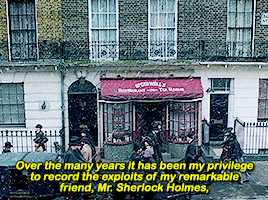
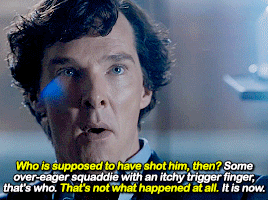
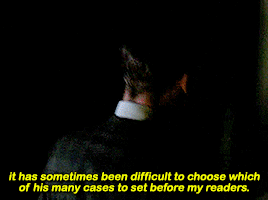
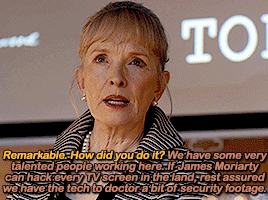
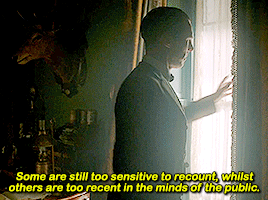
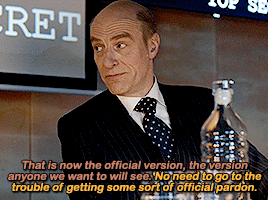
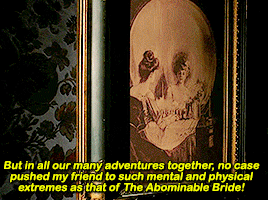
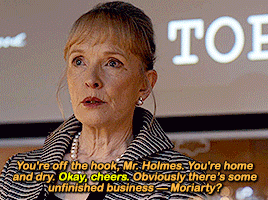
Looking Closer at How The Abominable Bride Foreshadowed and Can Be Used to Chronologically Decode Series 4:
In the opening of TAB, Sherlock imagines John narrating how as Sherlock’s biographer he picks and chooses which of his cases to present to the public, alluding to the nature of John as an unreliable narrator in the canon.
In the opening of TST, John writes Lady Smallwood and co. talking about modifying the footage of Sherlock shooting Magnussen and that their story will become the official one, setting up the nature of John as an unreliable narrator in series 4.
[Continue below the cut for more ➤]
See also: 10 Revealing Things From The Six Thatchers That Haunt You Late At Night, 10 Revealing Things From The Lying Detective That Haunt You Late At Night, and 10 Revealing Things From The Final Problem That Haunt You Late At Night. (#tw suicide)
Bonus: They’re not there:
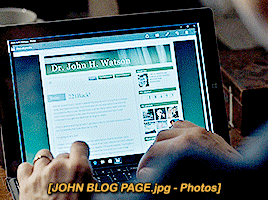
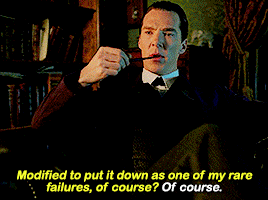
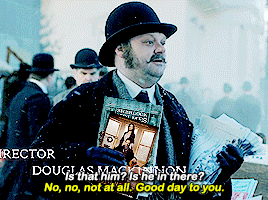
On John’s blog, he wears his heart on his sleeve. He adores Sherlock and clearly loves him even when he tries to downplay their relationship or play up his relationship with Mary. In his post about meeting Sherlock, he calls him “strangely likeable”, and talks like there’s life in for the first time in ages after multiple blog posts about how nothing happens to him.
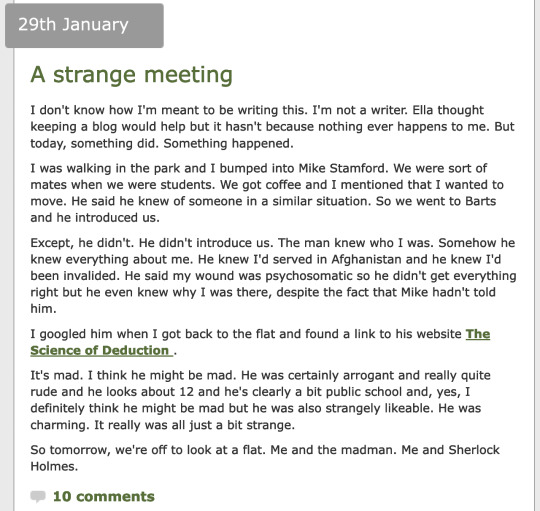
This includes how John thinks that Sherlock not only doesn’t love him back, but that he’s “spectacularly ignorant” about some things, including the way that he feels about Sherlock. How does the world’s only genius consulting detective not notice that? John is pretty forward about this is in one of his early blogs and first one about Sherlock’s cases.
He also says for the first time that he has to omit certain things in order to publish the story at all, echoing the nature of the original stories.
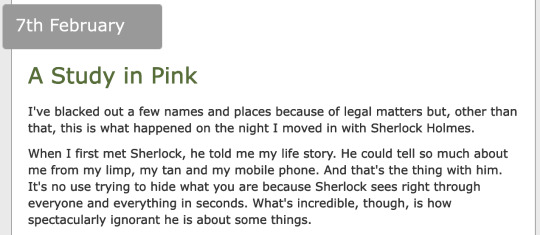
But Watson doesn’t say this in the opening of A Study In Scarlet; he straight-forwardly talks about his return from overseas and his meeting Sherlock Holmes, followed by the case that changes his life. It’s really in the other stories that Watson talks more about altering details, which is what the debate around his authorship revolves around.
It does provide an interesting comparison, though, the way that Sherlock hasn’t yet become the emotionless machine that the myth surrounding Sherlock Holmes is so obsessed with. He laughs, he dances, he expresses emotion alongside his deductions. The last line about Sherlock actually says, “Didn’t I tell you so when we started?” cried Sherlock Holmes with a laugh. “That’s the result of all our Study in Scarlet: to get them a testimonial!”
That changes with The Sign of Four. The opening of the second novel, following the success of the first, is about Holmes and Watson talking about the publication of their first case together.
Holmes: “Yes, indeed,” said I, cordially. “I was never so struck by anything in my life. I even embodied it in a small brochure with the somewhat fantastic title of ‘A Study in Scarlet.’ ”He shook his head sadly. “I glanced over it,” said he.
Holmes: “Honestly, I cannot congratulate you upon it. Detection is, or ought to be, an exact science, and should be treated in the same cold and unemo- tional manner. You have attempted to tinge it with romanticism, which produces much the same effect as if you worked a love-story or an elopement into the fifth proposition of Euclid.”
Watson: “But the romance was there,” I remonstrated. “I could not tamper with the facts.”
Holmes: “Some facts should be suppressed, or at least a just sense of proportion should be observed in treating them. The only point in the case which deserved mention was the curious analytical reasoning from effects to causes by which I succeeded in unraveling it.”
Watson: I was annoyed at this criticism of a work which had been specially designed to please him. I confess, too, that I was irritated by the egotism which seemed to demand that every line of my pamphlet should be devoted to his own special doings. More than once during the years that I had lived with him in Baker Street I had observed that a small vanity underlay my companion’s quiet and didactic manner. I made no remark, however, but sat nursing my wounded leg. I had a Jezail bullet through it some time before, and, though it did not prevent me from walking, it ached wearily at every change of the weather.
As Sherlock Holmes becomes more of a text, the more Watson mentions about how he to change names, dates, details, or wait until certain people are dead until his stories are published, to protect international secrets and the lives of its characters. But it all started with Holmes and Watson in a flat, talking about how the romance should be suppressed.
In one of John’s early blogs he mentions a fortune cookie at the end, pulling a quote from The Valley of Fear:
“Everything comes in circles—even Professor Moriarty. Jonathan Wild was the hidden force of the London criminals, to whom he sold his brains and his organization on a fifteen per cent. commission. The old wheel turns, and the same spoke comes up. It's all been done before, and will be again. I'll tell you one or two things about Moriarty which may interest you.”
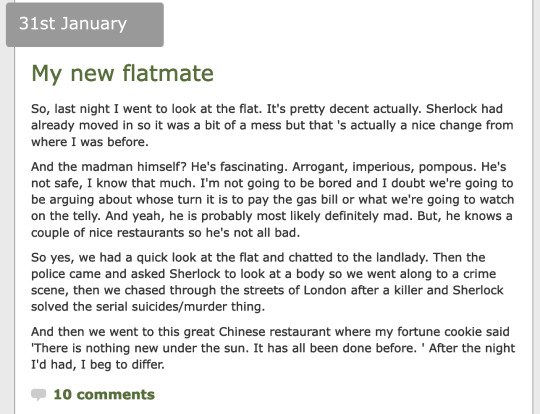
Except John says he think it’s going to be different this time. This version is going to do something different before. It’s going to admit that the romance was there. It’s not going to suppress it anymore by the end. But before it gets there, the story is also about how much, and what therein, the story is being altered in the first place. Enter series 4.
An important blog entry to understanding the mindset of Sherlock and John after series 3 is the last blog entry. To date, the blog is still suspended because if it continued the true nature and mystery of series 4, the answer would be spoiled.
It reads as follows:
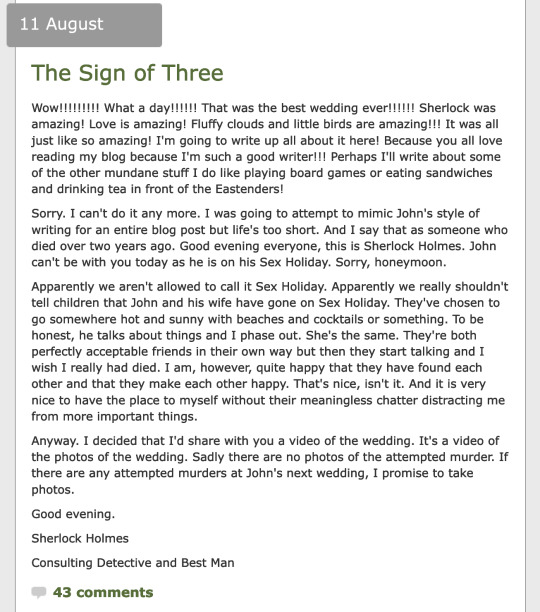
Sherlock is openly disinterested and angry at the wedding to anyone who’s paying attention. And not without reason.
The ending of TSOT is one of the most devastating moments in the show. John and Sherlock both realize that neither of them wanted this marriage to happen, that they could have been together and in this passing look they know it’s moments too late after Sherlock realizes Mary is pregnant.
It happens and disappears in a moment.
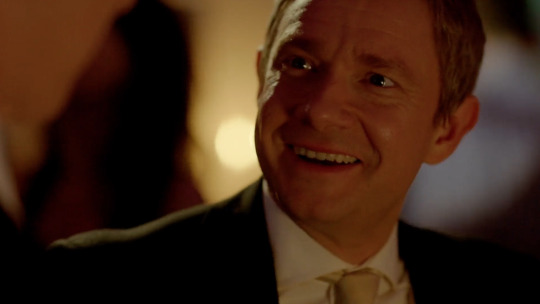
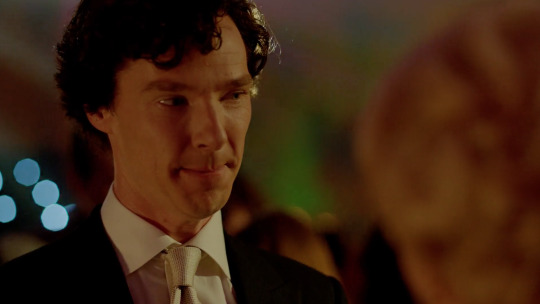
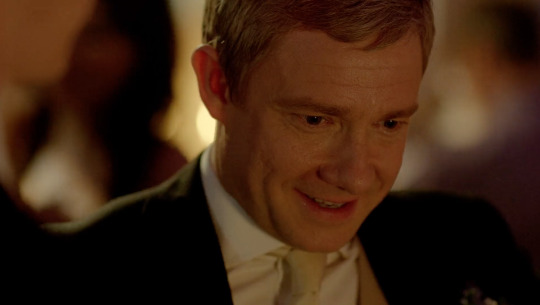
Sherlock leaves the wedding early. A month and one honeymoon later, John will be bursting to get out of his trainwreck of a marriage at every waking moment. He’ll bike to work. He’ll keep his bags packed. When he rejoins Sherlock in the flat he’s practically giddy, and then when he meets Janine and Sherlock explains that he used her later, he’s right back at wondering if Sherlock is capable of loving anyone or not.
And none of this is remotely mentioned in the blog entry. Sherlock takes over for John, foreshadowing that the next act of the show is about to retell The Casebook of Sherlock Holmes, which includes two stories entirely narrated by Holmes. HLV is one of the most devastating episodes of the show and it’s not on the blog at all. The public doesn’t know anything about what happened to them.
The next time we see John’s blog it’s going to say this. Absolutely nothing about their time gone, what Sherlock did or what John is going through. Of course, nothing about Mary either. He isn’t even typing anything like normal; he just fidgets his two fingers on the same two keys, and his blog isn’t on the screen. It’s a screenshot. Because what we’re watching is the blog itself.
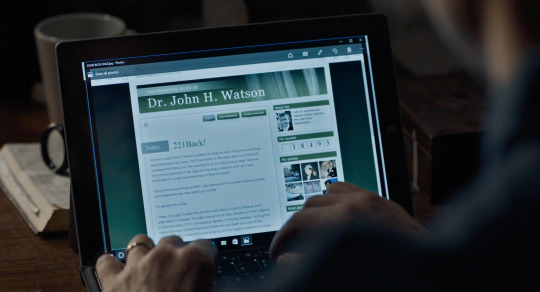
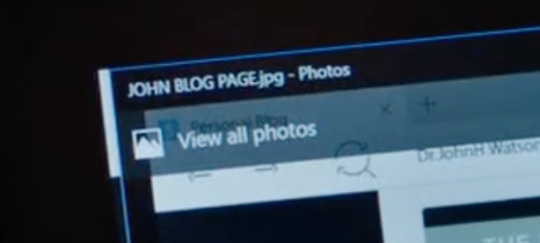
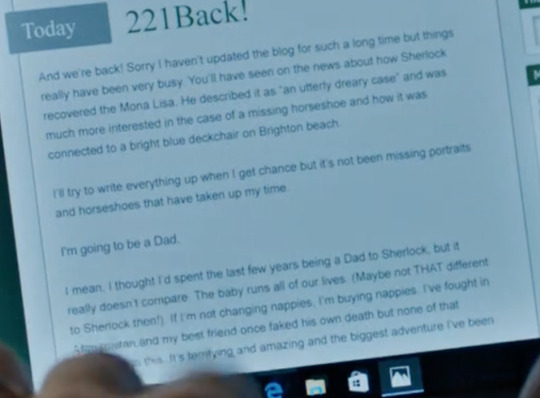
So the parallel starts thus:
After setting up his dream world and arriving at 221B Baker St., and a conversation with Mrs. Hudson about the way that John modifies people to be characters in his story, Sherlock imagines John giving the following narration
Watson: Over the many years it has been my privilege to record the exploits of my remarkable friend, Mr. Sherlock Holmes
The beginning is about putting up the front of John’s purpose and their relationship, calling Holmes his remarkable friend. In the next episode, John as the author takes liberties of his own in order to protect the people in it. He protects himself and Sherlock by covering up the true events of Mary’s death.
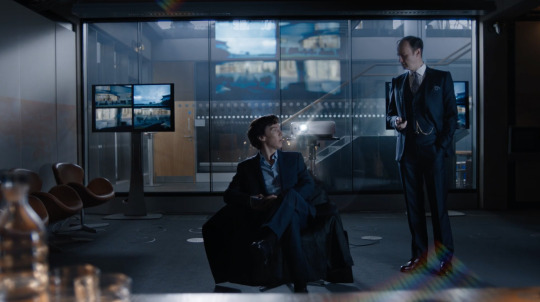
In TST, the opening scene is about doctoring the footage of Sherlock shooting Magnussen. With a bright projector light behind Sherlock’s head, the footage cuts out Sherlock putting the trigger as someone walks past the camera. This is being displayed as top-secret information as all of them sit inside a glass window room anyone could sit through.
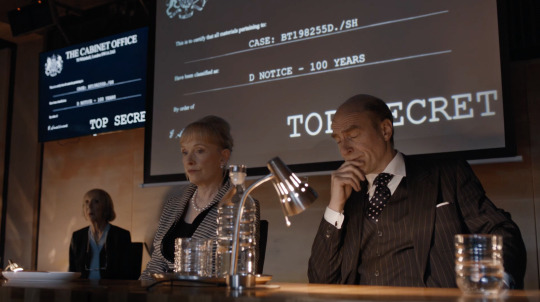
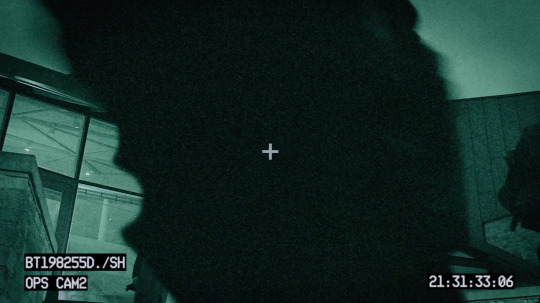
Sherlock and Mycroft describe how it’s different:
I see. Who is supposed to have shot him, then?
Some over-eager squaddie with an itchy trigger finger - that's who.
The over-eager shooter in this story has already conveniently been placed in the room. She has her own pen and paper, but isn’t writing anything down, which is her job as a secretary. It’s because a copy of that text, this conversation should exist, but it doesn’t, because Norbury doesn’t exist. Mycroft tells her not to write it down and put down it down, because once they’re beyond these walls, they must “never speak of it.” There’s also the meaning of Mark Gatiss being a stand in for the show’s writers, similar to the meaning of when John finds the dog’s bones, a correlation to Emelia Ricoletti’s grave being a switch.
It also creates a connection between John the author and Norbury. She’s the one with the pen and she’s going to take the fall, but John is the one who really shot Mary.
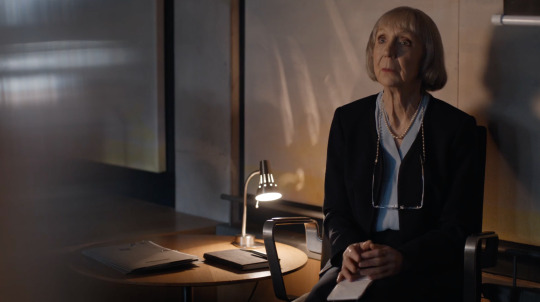
Back in TAB, John continues about how he picks and chooses cases to tell:
Watson: it has sometimes been difficult to choose which of his many cases to set before my readers.
That includes, as far as we know right now, the entirety of HLV. He leaves out Magnussen, Mary shooting Sherlock, Mary’s past, and Sherlock shooting Magnussen at once. It’s not just about the cases though, it’s about other things that John leaves out of his story.
In Sherlock’s mind: it’s not just smaller things that John says, like Sherlock being “spectacularly ignorant” about certain things and wounding his ego or embarrassing him, it’s that John never picks up on how much Sherlock loves him. John is hiding the true nature of their relationship from the world because he doesn’t see all the deductions of how much Sherlock loves him back.
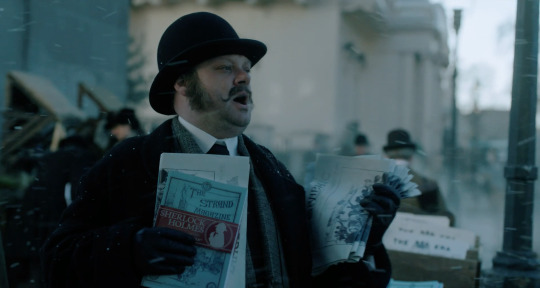
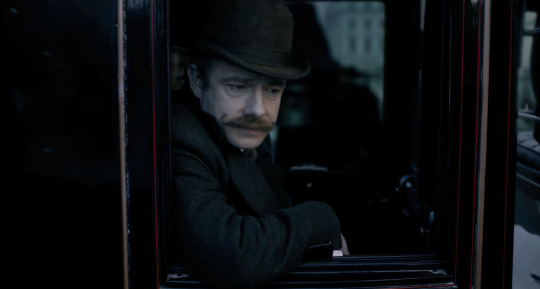
Immediately after the credits in TAB John is praised by for the success of the Adventure of the Blue Carbuncle by a man selling Sherlock Holmes branded content in The Strand Magazine, asking if “there’s going to be a proper murder next time.” He inquires if Sherlock is in the carriage at sight of his profile, the same one printed on the paper he’s carrying, and John dismisses him at Sherlock’s behest. That particular story is from the first short story collection, after A Study In Scarlet and The Sign of Four, and before Sherlock’s presumed death in The Final Problem.
“Remarkable. How did you do it?”
“We have some very talented people working here. If James Moriarty can hack every TV screen in the land, rest assured we have the tech to doctor a bit of security footage.”
John isn’t just talking about how easy it is to doctor footage, but that it’s even easier for him to do as a writer with words. He doesn’t need any government technology to alter the story. All he needs to do is the essence of this scene – lie and invent. Like when John invents the story about Eurus in order to lie about what happened to him where he has a pen and paper.
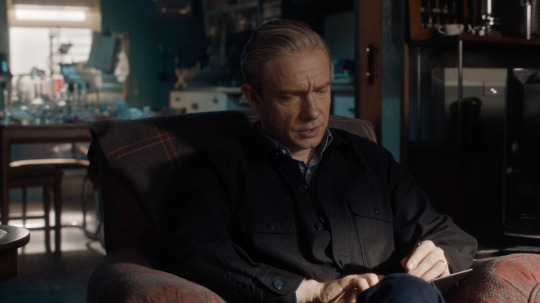
Watson admits the reason he has to do this back in TAB:
“Some are still too sensitive to recount, whilst others are too recent in the minds of the public.”
At the end of the story, Sherlock will ask to make sure that Watson modified the story, to “put it down as one of my rare failures, of course?” The story was progressing like a normal adventure until Sir Eustace’s murder, and then the entire second half of the story was omitted. Sherlock helped Lady Carmichael get away with murdering her husband. He broke his vow, it’s one of his “rare failures”. Sherlock is imagining their marriage in order to try to predict what would happen in the near future and what danger John would be in.
Mary is the case and she becomes the case the next episode. It’s at this point in TAB that we see a shot of the knife in the mantle – connecting to TLD when Mary’s case, the message tied to the dagger, or the case on how to save John, is the one Sherlock still hasn’t solved. The knife is still there in the fake ending of TFP. John thinks he still hasn’t solved it and that’s why he was shot at the end of TLD.
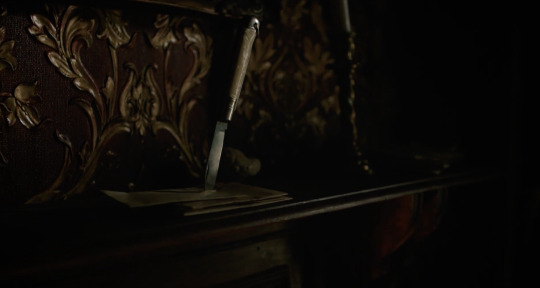
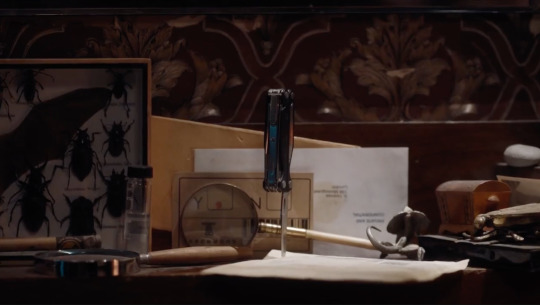
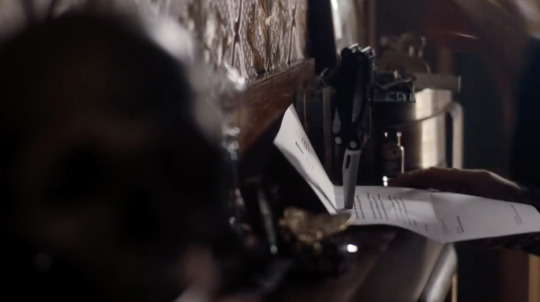
Mary is Sir Eustace with the dark past coming back to haunt her. Mary is the post-humous revenge Sherlock alluded to, the vengeful bride who faked her death to kill her husband, the figure of Death in the Samarra story, and half the ultimate villain – but some cases are still too sensitive to properly recount. Moriarty isn’t back. No, no, no. He’s definitely dead. He planned his revenge on Sherlock five years ago by filming a bunch of reaction gifs and jiving against the glass with Eurus like a snake.
The next episode, Mary’s past comes back to haunt her, and Sherlock breaks his vow. One of his “rare failures”. The over-eager shooter is hauled away as the projector lights the back of her head.
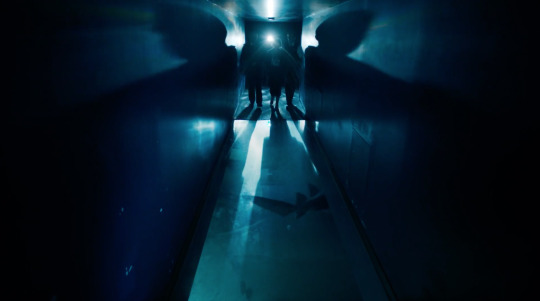
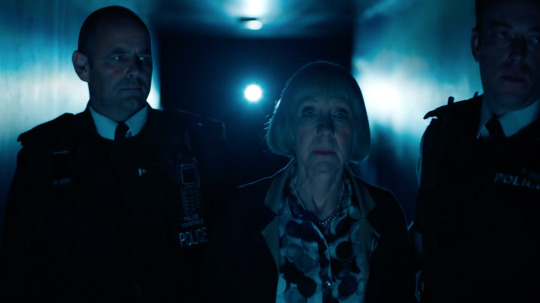
Mary’s death isn’t the only case that John covers up, however. He manages to do that relatively consistently. Even with how on the nose it is, the audience was convinced. The most convincing case is the one that John doesn’t show at all; the cover-up of his own death.
In TST, it’s clear this is about getting away with murder:
That is now the official version, the version anyone we want to will see.
No need to go to the trouble of getting some sort of official pardon.
Lady Carmichael doesn’t have to bother with a pardon and neither does John. His cover-up story, The Final Problem, is an entirely invented entry in the great Sherlock saga, using the name of a real one as a red herring, ending their story and establishing normalcy so no one will know what happened to him next. Series 4 is what happened, officially. But it’s not the truth. John has modified the truth. The romance has been suppressed.
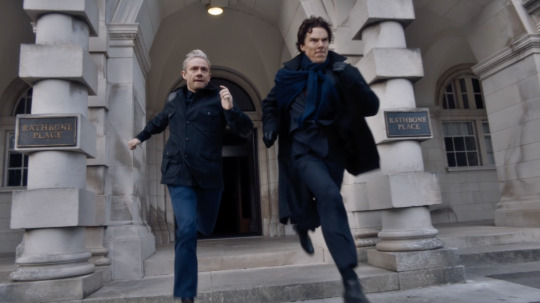

John can’t tell that story because he has to make it convincing enough to draw Mary into the open; he doesn’t want to go to the trouble of getting a pardon when he has to face her again. This has to be the version everyone believes so that when it’s revealed that John committed suicide, everyone believes that too.
John has let his insecurities, self-hatred, and suicidal ideation leak into the subtext of series 4, so that when the news gets out about what really happened, and that the last story in particular was a total fabrication, people believe the secret story hidden beneath the true one. Suddenly the decline of hi stories becomes the tragic tale of a man losing his way and taking his lie. The story ends on a low note. “It’s gone a bit downhill, hasn’t it?” And it is emotionally true, but it’s all part of John’s bigger plan to fake his death.
When Eurus as Faith gives Sherlock the note about Culverton Smith she writes one story on the surface, the one that Sherlock deduces, but hides another message underneath that he doesn’t see until it’s too late. This is the case he didn’t solve.
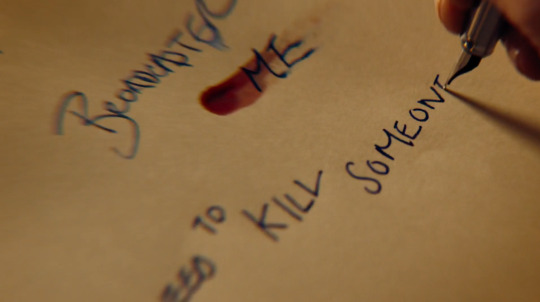
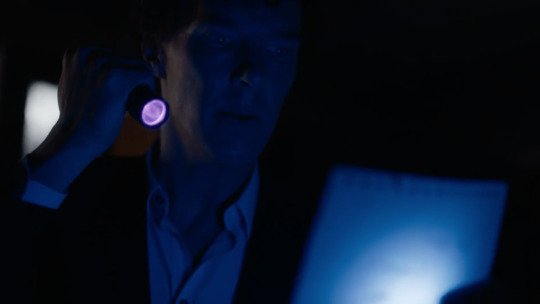
This is what John’s story is: one text subsumed by another bubbling just beneath its surface. When John’s original story falls through because of what happened at the end of TLD, darkness completely overwhelms his story in TFP. Sherlock is drowning in it until he ties a nice bow on the ending. One coverup hiding another coverup. That’s how you sell a big lie; you wrap it in the truth to make it more palatable.
One of John’s blog entries has a picture of the knife stabbed into a clue board. Sherlock figured out that the victim faked his own death.
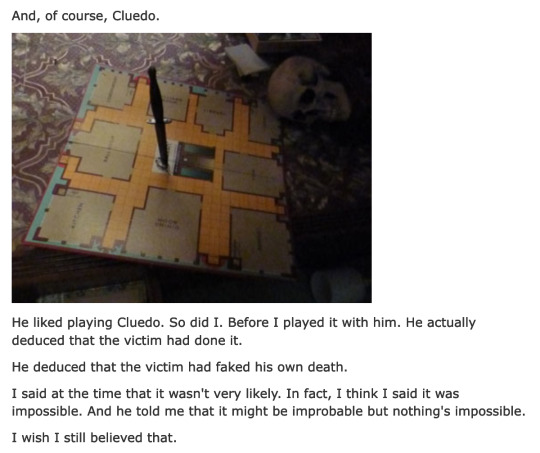
TAB foreshadows the lengths John goes to:
But in all our many adventures together, no case pushed my friend to such mental and physical extremes as that of The Abominable Bride!"
Sherlock is pushed all the way to the predestined end of the story, clinging to life at the Reichenbach Falls with Moriarty punching him down. It’s only when he decides to let John in emotionally that he appears, foiling him easily, kicking over the falls like he isn’t a threat at all. Because he isn’t when they’re together and they openly love each other.
John doesn’t have the same confidence. John thinks that he can’t avoid Samarra – that even if he fakes his death, that happy ending he invents at the ending of TFP is the closest to happiness that he’s ever going to get. Sherlock has more confidence in John and what they can accomplish together. “I’m a storyteller. I know when I’m in one.” The real John knows it too, but he can’t see the same ending Sherlock does if he still doesn’t know Sherlock loves him back. John’s ending is a dark mirror and denial of Sherlock’s hopeful vision.
Nothing has pushed John to such mental and physical extremes as that of the abominable bride. Mary faking her death, returning to manipulate and gaslight him, and trying to get him to commit suicide to burn Sherlock’s heart out of him forever is the worst thing that John’s ever been through. The most trying case in his career working with Sherlock. Faking his death, however, isn’t the end. Because the whole point in all of this is to outsmart Mary and Moriarty, drawing them into the open so John can make his move.
Smallwood: “You're off the hook, Mr Holmes. You're home and dry.”
Sherlock: “OK, cheers.”
Smallwood: “Obviously, there's unfinished business. Moriarty?”
For Sherlock, his unfinished business is Moriarty. For John, it’s Mary. They’re going to have to work together to finally defeat them once and for all – and they can only do that once they both know the truth. Nothing can stop them. Then the spoke will turn, and the world will have something new.
But for now, the truth has to be modified. The romance has to be suppressed. Until the world is convinced John is dead and he’s in the clear.
“That’s not what happened at all.”
“It is now.”
#sherlockedit#tjlcedit#johnlockedit#sherlock bbc#tjlc#john watson#sherlock holmes#mary morstan#vivian norbury#meta#the abominable bride#the six thatchers#edits#gifset#gifs#looking closer at tab timeline#television#john's blog#series 4
89 notes
·
View notes
Link
It turns out love can conquer crow’s feet. Executive producer Maril Davis on the period drama’s decision to let love, not age lines, drive Claire and Jamie’s reunion arc despite a 20-year time jump.
There’s always been plenty to envy about Claire and Jamie, the star-crossed couple whose centuries-spanning romance propels the period drama Outlander. They’re capable, brave, and beautiful, blessed by an unbreakable bond, strong convictions, and even stronger sex drives. Since the series’ first season, their ear-pleasing accents, smoldering, soul-searching looks, telegenic love-making, and repeated rescues of each other’s lives have set a high standard, relationship-wise. But recent episodes of Outlander have introduced us to yet another quality we wish we had in common with Claire and Jamie: They’re almost immune to aging.
By their third seasons, many TV series settle into a rut—a familiar and welcome one, in the case of some comfort TV, but less so for hour-long dramas with fantasy elements, which traffic in twists and upheaval. But disrupting the status quo wasn’t a struggle for Outlander, an adaptation of Diana Gabaldon’s book series, which comprises eight novels (with a ninth on the way) and assorted shorter works. Through 37 episodes, the Starz series’ story is still closer to takeoff than landing, working through the third book in the sequence, 1993’s Voyager.
The events of Voyager dictated an unorthodox interlude for a program that’s centered on the interplay (and intercourse) between two charismatic and chemistry-laden leads: an extended separation and a mutual 20-year time jump. At the end of Season 2, the pregnant Claire (a 20th-century English nurse who in the first season accidentally slips into the past through, um, a mystical stone) and Jamie (her 18th-century, red-haired highlander lover) are forced to break up by the impending Battle of Culloden, at which Jamie, a Jacobite rebel, expects to be (and nearly is) killed.
To protect their soon-to-be-born daughter Brianna, Claire (played by Caitriona Balfe) returns to the 1940s. Believing that Jamie (played by Sam Heughan) did die, she does her best to move on, relocating to Boston, raising Brianna, becoming a doctor, and growing apart from her first husband, Frank, who’s caring and attentive but lacks Jamie’s highland lilt, kilt collection, and Men’s Health cover physique. Jamie, meanwhile, survives battle, torture, and imprisonment (nothing new for him), grows and shaves a big beard, fathers a son, pivots to printing and smuggling, and gets married again out of loneliness, all while carrying an eternal torch for Claire. Midway through the third season, after almost five episodes apart, they reunite in the mid-1760s, two decades older but no less in love—and, curiously, looking a lot like they did the last time they were together.
“I wanted to look—well, the same as when you last saw me,” Claire says with some trepidation during their first conversation, admitting that she’s dyed away the single gray streak that had appeared in her hair in earlier, Boston-centric scenes. Mission accomplished, Claire. Neither member of Outlander’s leading duo looks any worse for wear after 20 years of imprisonment, parenthood, and pining for lost love.
For Outlander’s creators, the time jump presented a production dilemma, not because of the story (which Gabaldon had already plotted out) or setting (most viewers aren’t well-versed in the intricacies of 1740s vs. 1760s style), but because of the actors’ appearances. In real life, a two-decade difference isn’t invisible, no matter how much St. Ives Oatmeal and Shea Butter Lotion you lather on because of Balfe.
Heughan, 37, and Balfe, 38, were both 34 when the series premiere aired in 2014, but their characters were considerably younger. “Jamie’s kind of early 20s, Claire is late 20s when it starts,” Outlander executive producer Maril Davis says by phone. Three years passed between Claire’s first time jump back to 1743 and the Battle of Culloden, which, Davis says, would put both of them in their “mid- to later-40s after the [20-year] time jump.” Although the creators talked about shortening the story’s time jump to reduce the need to alter the actors’ appearance, they found that they couldn’t do it without omitting too many plot points from the characters’ time apart.
Aware that the time jump was looming, the producers started doing screen tests last season with Balfe and Heughan, in consultation with head of hair and makeup Annie McEwan, who had worked on Season 4 of Game of Thrones before joining the Outlander crew. After experimenting with various looks, the creative team decided, essentially, that both Balfe and Heughan were too hot to convincingly tamper with by obscuring their actual features. “We have two actors who happen to be incredibly beautiful people,” Davis says. “It is hard to make them look bad, damn them.” Originally, the pair’s first post-reunion sex scene featured a reference to stretch marks, but the writers lost that line from the script, Davis says, when the makeup crew informed them that stretch marks “don't read very well on camera.”
Even apart from the specific challenge of wrinkling, graying, and thickening two age-resistant actors, the transition from 20s to 40s is a particularly tough one. “It's hard to make young people look incrementally older,” Davis says. “It's obviously a little easier—and I put ‘easier’ in quotes—if you're aging someone up from like 30 to 80. … With two actors who look so young anyways in their real life, we realized that we couldn't do major jumps without it looking fake, and also taking a lot of extra time in hair and makeup, as well as using a lot of extra prosthetics.”
For Davis, a veteran of more explicitly sci-fi (and more makeup- and prosthetic-reliant) productions such as Star Trek and Battlestar Galactica, Outlander’s understated approach to the aging process didn’t come intuitively. “There were some times that I said to our hair and makeup team, ‘Can we go farther? Because you can't read some of these lines that you're painting on camera,’” Davis says. “And they were horrified. They were like, ‘Are you kidding? Oh my god, we can't go any farther.’ It's interesting, because you also have to take the advice of people that have been in the business doing the hair and makeup a long time, knowing that they can only go so far until they feel uncomfortable because it doesn't look real anymore.”
In addition to the aging uncanny valley, there’s the time cost to the talent and crew to consider. A heavier hand on the cosmetic side—on top of the prosthetic flogging scars already applied to Heughan’s back in shirtless scenes for much of the series’ run—would mean much more time in makeup chairs, staring blankly into mirrors as fake years and real hours add up. Though according to Davis, Balfe and Heughan, who were frequently consulted, never expressed any reservations about hiding their youth under veneers of age. “They're both very game for whatever we want to do, and so this isn't a vanity thing,” she says. “Neither of them, I don't think, at any point has ever said, ‘I have to look good, so don't make me look too old.’”
This was a weighty decision, because the ramifications for the series could extend far into the future. Unlike some shows or movies that might insert a brief flash-forward in a single scene or episode, Outlander is committed to the time jump for the long term. Whatever aging the crew applied to Balfe and Heughan now would sentence them to the same look for years to come on a series that may still be relatively early in its run (which already has been renewed for a fourth season). That’s not only a nuisance, but potentially an acting inhibitor, as Davis says Heughan discovered while wearing his wild beard in the third season’s second episode. “If you have something on your face like that, sometimes it's a little harder to talk, you're more aware of it, it takes you out,” Davis says. “So all of these things are factors, and same with if we were getting into heavy prosthetics to make actors appear much older than they are.”
The end result of all the discussion and screen tests is a difference so subtle that you have to squint to see it—just like the new, older Jamie has to squint to see small text without wearing his reading glasses. Specs aside, he looks almost unchanged. “With Sam, we've kind of weathered him, adding more shading to his face,” Davis says. “We've got some lines that the hair and makeup department have put in themselves, and then greying at the temples for him, as well as with Caitriona. We realized because her skin is also so young that we'd have to sell a lot of it with the gray in her hair.” Of course, even that gray is gone now, at least temporarily, although Davis says its absence stems from an impulse to portray Claire’s humanizing insecurity, rather than a need to preserve the stars’ romance-novel looks (which she acknowledges are part of the show’s appeal). “So much of our talk about appearance is motivated from a character standpoint,” she says. “I don't think we ever go, ‘Oh my god, they have to look amazing because this show is trying to sell a fantasy element.’” But who’s to say that the mystical stones don’t have anti-aging effects?
In navigating the time jump, the producers’ overriding desire was to avoid distracting the audience by going overboard on aging. “You don't want to be taken out of the moment, sitting back watching at home,” Davis says. At times, though, the lack of aging is its own sort of distraction. My wife and I giggled through one supposed-to-be-tender scene as the script tried to sell us on these nearly identical-looking 30-something specimens as people pushing 50. “I don’t look like an old man?” Jamie asks self-consciously, shortly before exposing his still-chiseled chest. And Claire, after completely disrobing to reveal her youthful frame, tells an admiring Jamie, "You must really be losing your eyesight." Nobody’s buying it, guys.
The aging-related dialogue is less jarring when it alludes to the absurdity of the situation, as when Claire marvels to Jamie, “Most men in their 40s have started to go soft around the middle. You haven't a spare ounce on you,” or when she greets the family lawyer by exclaiming, “You look exactly the same!” (No Battlestar fat suits here.) In other scenes, though, the actors convincingly convey the passage of time through emotion, even though they both remain outwardly radiant. “We had so many discussions with Caitriona and Sam about this internal aging, because some of it, you are trying to sell this gravitas of 20 years of loss through their acting, which I think they do so well,” Davis says.
The best asset Outlander has in hand-waving its characters’ immutability is an audience that’s willing to suspend disbelief. “Let's be honest, we could've kept these two apart for a week and it would've seemed like an eternity,” Davis says. “I think for the fans it probably seemed like 100 years—for us as well. So I don't think we needed to add to that at all.”And if—like a lot of the Outlander faithful—you’re the sentimental type who doesn’t mind some soapiness, you’ll accept that love can conquer crow’s feet. “I think in a weird way, that 20 years just kind of faded away when they saw each other again,” Davis says. “In some ways, it was like so much time had passed, and in other ways it was like no time had passed at all because that love had never died.”
With the reunion episode’s semi-awkward aging exchanges behind it, Outlander soon stops dwelling on appearances: The following week, Jamie fireman’s carries a man from a burning building, and the week after that, not-so-newlyweds Claire and Jamie tear off their clothes and writhe around on the floor. Most Outlander watchers wouldn’t have it any other way.
Judging by the books (spoilers!), there’s still a chance that we’ll see an actually old-looking Claire and Jamie in future seasons. “If we're lucky enough to do all the books, they're in their 60s in the current books,” Davis says. “So we do want to also have somewhere to go, and we do need to use, as a base, our two actors, who are very young, and so we want to be with them on this journey.”
But based on this season, don’t be surprised if the 60-something couple doesn’t look a day over 45. “Time doesn’t matter, Sassenach,” Jamie says in Season 3’s sixth episode, using his pet name for Claire. “You will always be beautiful to me.” And also, most likely, to everyone watching at home.
#outlander#outlander starz#maril davis#caitriona balfe#sam heughan#jamie x claire#tv news#people: caitriona balfe#people: sam heughan#A. MALCOLM#3x06#tv: s3#queue
153 notes
·
View notes
Text
Using the past to handle the present? A story recurring.
Who doesn’t love to hear a story?
We operate with narratives on a daily basis. They constitute humans primary mode to cognitively structure the world we exist in. A narrative essentially presents a fundamental tool of thought in order to accept time, process and change. Without a narrative structure to what is and has happend, our brain would have a hard time to process the incredible amount of stimuli it gets bombarded with and to introduce order to the chaos. Not to mention the difficulties we would encounter in understanding the abundance of information we are presented with in the course of a day. It is an effective mean to reduce complexity and detangle convoluted situations into a sequenced chain of events (Shenhav 2006). Gerald Prince defines a narrative as “the representation of at least two real or fictive events or situations in time sequence, neither of which presupposes or entails the other.”(Prince n.d.)
A narrative thus consists of three basic elements:
First, the actual events that took place, the characters, including the main actors, involved and background information on the geographical setting as well as social and institutional circumstances. In a next step it creates a temporal continuum, thus stringing incidents into a chain of events. Lastly a narrative attributes cause and effect to events unfolding and following after each other as well as to the way actors operate.
History reloaded
A historical narrative presents a certain type of narrative, that patterns reality of the past in a way to assign meaning to the present. Because a historical narrative takes up several functions concerning establishing legitimacy, forming individual and collective identity and generally constructing norms and worldviews it is often used as a tool in international as well as in domestic politics (Spencer 2016). Most historical events and their order can be emplotted in diverging manners and thus may present different interpretations what has occurred and what meaning is assigned to it therefore playing a crucial part in constructing the current political world (Spencer 2016).
The question of legitimacy is omnipresent as we have to be aware, that omitting certain incidents or emphasising specific events already represents an act of deliberate decision making on what and who is worth reporting and remembering to a certain degree. This selective process is a “product of society and power” (Sverdrup-Thygeson 2017, 56) creating a battleground on which a variety of groups and actors might fight to establish their narrative of historical events or episodes. .
Consequently, choices about which societal groups, factions or individuals are neglected or entirely eliminated in a narrative potentially entails serious repercussion into present political realities for example concerning minorities and marginalized groups as well the distribution and legitimacy of power in an existing system. Besides that, historical precedence approves what is done today by ascribing legitimacy to previous events, hence offering guidelines of behaviour and action for the present (Lowenthal 1985). They thus play a crucial role in constituting norms as “narratives are said to guide but also constrain behaviour as pre-existing narratives embedded in culture offer means of interpreting phenomena and thereby explicitly or implicitly give advice on how one should react” (Spencer 2016, 18).
Furthermore, tying events which oftentimes happen simultaneously, into a specific sequence naturally encompasses a particular perspective which a narrative inevitably is the product of. Accordingly, awareness on implicit and explicit selective choices together with sequencing processes presents a fundamental necessity for informed and responsible individuals in order to evaluate and contextualize the historical and political narratives we are confronted with.
Yet, historical narratives serve another purpose: They provide stories vital in order to attach the individual to the collective and subsequently the collective to the past (Sverdrup-Thygeson 2017). They are fundamental in establishing one's group as well as political identity as they disclose the paths and mechanisms that lead to the current world and reality we find ourselves in. Nevertheless, as illustrated above, they only shed light on a specific path and perspective, thereby offering insights on how individuals and communities understand and situate themselves in relation to others. By formulating categories of in-groups and out-groups historical narratives take up an important role in shaping and expressing political identity as well as establishing and maintaining ideologies. Meaning and causality ascribed to events of the past and the lessons learned from it thus continuously shape politics in the present (Shenhav 2006). Because our perception of the past is fundamental in forging our identity, internalizing novel narratives has considerable potential to alter our identity and the identity of those we interact with (Sverdrup-Thygeson 2017).
That capability makes narratives effective and powerful means for political actors and groups in order to forward their objectives and assert power.
Establishing truth
So how does one find out which of the narratives is the right one, the one we should believe? Are we actually able to discern which narratives we might already internalized? And how should we then handle concurring narratives? Such questions should occur to us as we groups, factions or individuals are neglected or entirely eliminated in a narrative potentially entails serious repercussion into present political realities for example concerning minorities and marginalized groups as well the distribution and legitimacy of power in an existing system. Besides that, historical precedence approves what is done today by ascribing legitimacy to previous events, hence offering guidelines of behaviour and action for the present (Lowenthal 1985). They thus play a crucial role in constituting norms as “narratives are said to guide but also constrain behaviour as pre-existing narratives embedded in culture offer means of interpreting phenomena and thereby explicitly or implicitly give advice on how one should react” (Spencer 2016, 18). Furthermore, tying events which oftentimes happen simultaneously, into a specific sequence naturally encompasses a particular perspective which a narrative inevitably is the product of. Accordingly, awareness on implicit and explicit selective choices together with sequencing processes presents a fundamental necessity for informed and responsible individuals in order to evaluate and contextualize the historical and political narratives we are confronted with.
Yet, historical narratives serve another purpose: They provide stories vital in order to attach the individual to the collective and subsequently the collective to the past (Sverdrup-Thygeson 2017). They are fundamental in establishing one's group as well as political identity as they disclose the paths and mechanisms that lead to the current world and reality we find ourselves in. Nevertheless, as illustrated above, they only shed light on a specific path and perspective, thereby offering insights on how individuals and communities understand and situate themselves in relation to others. By formulating categories of in-groups and out-groups historical narratives take up an important role in shaping and expressing political identity as well as establishing and maintaining ideologies. Meaning and causality ascribed to events of the past and the lessons learned from it thus continuously shape politics in the present (Shenhav 2006). Because our perception of the past is fundamental in forging our identity, internalizing novel narratives has considerable potential to alter our identity and the identity of those we interact with (Sverdrup-Thygeson 2017).
That capability makes narratives effective and powerful means for political actors and groups in order to forward their objectives and assert power.
Establishing truth
So how does one find out which of the narratives is the right one, the one we should believe? Are we actually able to discern which narratives we might already internalized? And how should we then handle concurring narratives? Such questions should occur to us as tend to, consciously and subconsciously, select and adhere to “one truth” in order to simplify our lives and choices. Nevertheless one should ask is there really one “true” story while all the others are false? As stated above, a narrative necessarily presents a certain perspective and selection on what has happened, who did what and with which motives subsequently begging the question if one can simply dismiss diverging perspectives on the past and the world as wrong and with what means we might be equipped to make these choices.
A common saying indicates: “The truth lies in between.” Following that, one should be able to approach the truth by merely merging all existing narratives (which could potentially be an endless number) and extract the average overlap. Unfortunately, it is not that simple. First, one faces serious constraints as the human mind in not capable to process a single interwoven web of narratives and would necessarily resort to perceiving one viewpoint at a time (Shenhav 2006), thus rendering the idea of all narratives in one as means to assess the truth a useless endeavor. A second obstacle to search for truth is the uncertainty of reality’s genuine structure, a close to philosophical query. Though scholars have mostly come to agree, that a narrative in its simplicity seems unfit to satisfyingly and fully represent reality, there is contention about the extent to which reality in fact is patterned in narrative structure or if humans entirely impose a narrative pattern on reality as a result human processing of non-narrative reality (Shenhav 2006). Because we cannot establish which of the former is realties inherent shape and since our brain is unable process a hypothetical master-narrative we have to resort to other means in order to find our way and introduce order to the chaos of diverging stories and realities. Shifting one’s focus away from aiming at establishing truth by judging a narrative, to power dynamics in the discourse, offers a possible as well as feasible measure. Since discursive struggle is entrenched in societal as well as individual interaction and especially salient in political affairs as everyone intends to forward their narrative in order to forward their objectives. Therefore raising our awareness on which actors try to establish a certain narrative, what ramification that specific perspective would have on the current political reality and who might be their main target and audience (though we suppose they ultimately want to reach everyone) would already represent a step towards political maturity and critical assessment. The point thus may be not to state or evaluate the correctness of a narrative but to contextualise it in the greater discourse and in its environment by assessing its persistence and relation to other narratives. Knowledge on the position of a narrative within the overall discourse, meaning either a dominant or marginalized stance, already discloses substantial information. Our aim thus should not be to dismiss differing narratives as simply false but to recognize their origin, purpose and audience in order to enhance our understanding of our internalization processes, identity and relation to others and society and to put those under scrutiny.
Sources
Lowenthal, David. 1985. The Past Is a Foreign Country. Cambridge [u.a.]: Cambridge Univ.
Press.
Prince, Gerald.
Shenhav, Shaul R. 2006. “Political Narratives and Political Reality.” International Political
Science Review 27 (3): 245–62.
Spencer, Alexander. 2016. Romantic Narratives in International Politics: Pirates, Rebels and
Mercenaries. Manchester: Manchester University Press.
Sverdrup-Thygeson, Bjornar (2017). “The Chinese story: Historical narratives as a tool in
China’s Africa policy”. International Politics, 54 (1), pp 54–72.

Article supported by IFA-ZIVIK
0 notes
Text
Why Will Dany Burn King’s Landing?
youtube
Although most fans of A Song of Ice and Fire and Game of Thrones understandably aren't keen on revisiting the sloppy final season of the TV series, season 8 of the show is actually home to some of the most interesting indications of where the book series may or may not be going.
Season 8 was largely so confusing because the series was attempting to get across the finish line as fast as possible, but many of the messier aspects of the show were also clearly driven by the fact that Game of Thrones had already significantly deviated from the story that George RR Martin was trying to tell. So, when the time came for the TV series to end, the show had to push its characters into their decided endgames despite the fact that many alterations to their prior arcs now made those endings somewhat nonsensical.
George has already directly stated that the broad strokes of the ending will be the same in the books, but I think it stands to reason that the most controversial aspect of the series end, Daenerys' decision to burn King's Landing, will likely be significantly different within the books.
There are a lot of theories about how Dany's dark, or at least slightly darker, turn is going to go in the novels. Many fans unsuprisingly have come up with speculations that alleviate most of Dany's responsibility for the destruction of the city, but I think the notion that someone else will burn King's Landing or that Daenerys will burn the capitol by accident are extremely unlikely.
I can't envision a world where George RR Martin lets any of his main characters off the hook for the most destructive choice in the entire series, and frankly it has always been completely in character for Daenerys to justify any amount of devastation and destruction if it's in service of reclaiming the Iron Throne. And honestly, despite the fact that Game of Thrones retconned most of Dany's darkest book decisions and characteristics, even within the TV series itself, burning King's Landing was largely a logical extension of Dany's habit of killing anybody who gives even the slightest indication that they might not follow her.
However, it also seems undeniable that the burning of King's Landing is almost certainly going to come about due to different circumstances. And, it seems extremely likely that the omission of one significant character in the books, Young Griff, will be one of the key differences in the destruction of King's Landing and the entire Targaryen dynasty.
While I don't think Young Griff's non-Targaryen heritage is nearly as undeniable as many other fans do, one thing that seems very probable is that regardless of whether or not Aegon is really Aegon Targaryen, Daenerys will not believe that he is the long lost son of Rhaegar Targaryen.
Cersei becoming Dany's greatest rival never really made sense considering how few legitimate supporters she had. But on the other hand, someone like Young Griff, who has spent his entire life training to become the best king possible, seems like the kind of person who will likely win at least a significant amount of support among the lords of Westeros and the common people, who at this point would honestly prefer anyone other than Cersei anyway.
But, if Dany arrives in Westeros and there is a Targaryen who she doesn't believe is a Targaryen already sitting on the Iron Throne with the backing of a multitude of kingdoms as well as the common people, clearly she's going to be pissed. And obviously she's going to have a huge axe to grind with the boy who she believes has usurped her throne.
Dany has always been prone to violence to begin with, but now that she seems to have decided to go full fire and blood, it's not that difficult to figure out how she is likely going to handle Aegon the Sixth. But, I think that the penultimate episode of Game of Thrones may have already explained exactly how that is going to happen.
Like most fans, as soon as any information about the final season of Game of Thrones was released, I thought about what it could possibly be referring to or what it would mean. And one aspect of season 8 that seemed to not quite fit into anything within the rest of the series was the title of the episode "The Bells".
What initially interested me about that name was that not only was it the title for arguably the most important episode in the entire show, but that it referred to something that has a lot of thematic relevance within the books but that has been barely mentioned within the TV series. Bells are mentioned constantly in A Song of Ice and Fire, but they've only gotten a few nods within Game of Thrones. And I was even more surprised that, when the show actually aired, the ringing of the bells didn't seem to be hugely relevant to the episode itself either.
Yes, the bells do seem to trigger Dany's decision to burn the entire city down, but they aren't important before or after that, and when there are so many possible titles that are more connected to the series and the story, it still seems strange that "The Bells" was called "The Bells".
However, while bells are a bit of a perennial theme within A Song of Ice and Fire, I think one particular bell-themed subplot might be the exact history that is going to repeat itself when King's Landing burns to the ground, and I think that Daenerys might defeat Aegon in the second Battle of the Bells.
Jon Connington is another fantastic character who was completely omitted from the TV series, but it's interesting that the most fervent supporter of House Targaryen who was on the front lines fighting for Rhaegar in Robert's Rebellion seems to believe that the war wasn't actually lost in the Trident, but in Stoney Sept when Jon failed to root out Robert Baratheon.
JonCon's perspective on Rhaegar and on the entire war is undeniably warped, and in retrospect House Targaryen's dynasty was always destined to fail. Rhaegar may not have had the violent impulses of Aerys, but a dude who lets the entire realm devolve into chaos because he really needs to impregnate a teenager who is dubiously consenting at best was not going to bring peace and prosperity back to the realm. And in a broader sense, the Targaryen values of isolationism, superiority, subjugation, and consolidation of power seem to indicate that no matter what happened, as long as the Targaryens stuck to their beliefs then they were never going to hold on to the Seven Kingdoms.
But still, it seems incredibly important that Jon Connington believed that the Targaryens lost the Iron Throne in the Battle of the Bells, and it's even more important that he's almost certainly wrong. A Song of Ice and Fire has been pretty consistent in its portrayal of brutality. It has proven to be an effective tool in the short term, but it seems to have disastrous results in the long run. And, given that George RR Martin is an ardent pacifist, it's obvious that JonCon's belief that if he had only been crueler and more violent in Stoney Sept then the war would have been won for House Targaryen is a belief that is bound to be undermined.
The fact that Prince Aegon's greatest Westerosi supporter is so strong in this belief though seems to be an obvious setup for a clash in the future. It seems unlikely that the boy who Varys wanted to be the perfect king would be as brutal as someone like Tywin Lannister, and honestly, most people are not that violent nor do they believe that the only goal is winning no matter the cost.
But, it also seems to be a setup for a clash between Young Griff and Daenerys. After all, while most people wouldn't do absolutely anything to get what they believed was their birthright, Dany absolutely would. She internally justifies every action that she takes in service of getting the Iron Throne, and there doesn't seem to be a limit to the violence that she would excuse if it meant taking what she believes is rightfully hers.
The descriptions of the Battle of the Bells in Jon Connington's POV chapters are all very interesting, and it's telling that even in these few glimpses into his mind, this battle is so vitally important. But, Jon's memories are at their most interesting in the chapter "The Griffin Reborn," when he discusses his failings with Myles Toyne.
Jon tells himself that even Tywin Lannister couldn't have done anything more than what he did, but Toyne disagrees. Blackheart says “Lord Tywin would not have bothered with a search. He would have burned that town and every living creature in it. Men and boys, babes at the breast, noble knights and holy septons, pigs and whores, rats and rebels, he would have burned them all. When the fires guttered out and only ash and cinders remained, he would have sent his men in to find the bones of Robert Baratheon."
And while Myles is undoubtedly right that this is exactly what Tywin Lannister would have done, the particular description of the violence sounds undeniably Targaryen in nature. It literally sounds like fire and blood. And frankly, it sounds pretty close to what Daenerys did in Game of Thrones and is likely to do in King's Landing in A Song of Ice and Fire.
Conceptually, it's actually quite simple. Jon Connington will fight the Battle of the Bells once again, except this time he's going to be on the side of the new Robert Baratheon. If Young Griff is a remotely capable ruler who wins the hearts of the people, then it's entirely believable that the citizens of King's Landing would give him quarter when the dragon queen comes looking for him. And given Daenerys' typical patience level, it seems incredibly likely that Dany would just burn the traitors and find the bones of the usurper in the ashes.
Jon Connington has returned to Westeros operating under the belief that he is going to have to be tougher and more brutal to ensure that Young Griff ascends to the Iron Throne like Rhaegar never did, and to ensure that he's never overthrown like the Mad King was. So then, it would be a pretty perfect twist of fate if everything that Jon believes now winds up being proven wrong and he finds himself and the boy who he has vowed to defend to his last breath relying on the kindness of strangers to hide them from the Targaryen ruler and her armies who are searching for them.
And ironically, Jon will not do what he has set out to do, succeed for the son where he failed for the father, precisely because the enemy that he's facing now will be ready and willing to use the brutality that JonCon originally shied away from in Stoney Sept. If Young Griff and the elder Griffon were actually dealing with a rival who was similar to the younger Jon Connington, someone who wasn't willing to wreak havoc and destruction in order to find their enemy at all costs, then they might have a chance at at least surviving.
But, because Dany is the type of person who serves up fire and blood to anyone she thinks even might be her enemy, any of King Aegon's protectors will be treated with the brutality that Jon currently believes is necessary to win, and Young Griff will be killed anyway. And of course, while Daenerys will almost certainly win the battle against Aegon the Sixth, her decision to be as violent and swift as possible in order to root out her enemies will also lead to her ultimate downfall and a truly irrevocable end to the Targaryen dynasty.
Thematically, the repetition of past mistakes, the false belief that great violence in service of a supposedly greater good is worthwhile, and the false belief that brutality is strength, all fits in well with A Song of Ice and Fire and George RR Martin's political point of view. But obviously, given that Aegon Targaryen, Jon Connington, and their entire branch of the story was omitted in Game of Thrones, none of this could have ever happened in the TV series. And perhaps the title of the penultimate episode was a subtle nod to the climax that the writers know will be coming in the books.
#got#asoiaf#anti daenerys targaryen#aegon targaryen#young griff#jon connington#asoiaf meta#got meta#my videos
158 notes
·
View notes
Text
Kill la Kill: Physique Booster
In Episode 14, small pieces of Senketsu were distributed to 1-stars with high Life Fiber tolerance. An image on Satsuki's screen---apparently a simulation---showed a male 1-star becoming significantly more muscular upon attachment of one of Senketsu's scraps. Clearly, increased strength through body modification is expected.
This is the opposite of what you'd expect from a parasite. Parasites are well-known for making hosts weak and emaciated-looking, and Life Fibers are described as parasites.1
However, sometimes making a host emaciated isn't in a parasite's best interest. Indeed, some parasites are essentially harmless and cause no symptoms of parasite infection2.
The parasite causes the nurse cell to secrete vascular-endothelial growth factor, stimulating the growth of of small blood vessels around the cell and presumably increases the supply of oxygen. As far as I can infer, the physiological reactions that lead to muscle growth and the reactions leading to nurse cell growth are similar. If I'm correct in concluding this, then parasites could be chemically capable of increasing the size of host muscle tissue.
Notably, the Senketsu scraps (but not Goku Uniforms or Kamui in general) cause the formation of large vein-like growths on the user. This is comparable to Trichinella causing growth of small blood vessels around their nurse cells. As Kamui explicitly feed on blood (rather than electrical impulses, as Life Fibers in general feed on3), it makes sense that the scraps would have specialized structures to ensure a good blood supply. Whether these vein-like growths come from the scraps directly or are made by chemical influence of host cells is unclear.
For many castrator parasites4, infection is associated with the host's body growth. For example, water fleas (or Daphnia) infected by the parasitic (or pathogenic) bacterium Pasteuria ramosa become larger than normal.5 Though not castrators, Diphyllobothrium mansonoides (also known as Spirometra mansonoides) and Schistocephalus solidus, both tapeworms, cause enhanced growth in respective snail and three-spined stickleback hosts.
Whether the phenomenon is an adaptation of the host to parasite infection or the parasite "sculpting" the host to its advantage is unclear. The mechanism may vary for each parasite-host relationship. However, it is known that D. mansonoides outright creates growth factors.6
Though P. ramosa and other gigantism-inducing parasites are castrators, the beefed-up male students in Sanageyama's division appear to have prominent crotch bulges. (You'll have to imagine it; for modesty's sake I omitted the full picture) This could, however, be a false positive. Perhaps every male late-teenager looks awfully bulgy in a wrestling singlet-like garment.
Though no single parasite causes massive body-wide muscle growth, it's not biologically impossible for a parasite to accomplish this effect. After all, the power-up's effects---body growth and muscle tissue modification---do exist in real-life, if in a reduced form.
Tsumugu, episode 5: "It's a parasite!" Aikuro, episode 16: "They're [Life Fibers] parasites from outer space." ↩︎
Unless, of course, the host carries a massive number of the parasites. Even if a specific parasite species takes little from the host, in sufficient numbers symptoms will manifest. ↩︎
Episode 16, Aikuro Mikisugi: "When they [Life Fibers] infest a lifeform, they feed off the electrical currents of their host's nervous system." ↩︎
The term "castration" is used loosely. More precisely, castrator parasites inhibit host reproduction, regardless of host sex, through a variety of methods. Sometimes, so-called "castrators" don't render a host completely incapable of reproduction. ↩︎
For more information, see this link. ↩︎
"Enhanced growth in mice infected with Spirometra mansonoides (Phares 1996) and in snails infected with digenean worms (Hordijk et al. 1992) is a consequence of secretion of growth enhancers by the parasites." Source: Parasite-associated growth enhancement in a fish-cestode system ↩︎
4 notes
·
View notes
Text
The most important Star Wars character of all time is Wat Tambor, leader of the Techno Union Army
1p>> In some means, productions are aesthetic results, but when it comes to lightsabers, Wookiees, R2-D2, and also Darth Vader, the best long-lasting Celebrity Wars traits aren't for your eyes, however instead for your ears.
Most hardcore Celebrity Wars enthusiasts understand that legendary sound designer Ben Burtt is accountable for R2-D2's tones as well as the hum of a lightsaber, yet performed you recognize that this person likewise had a scene-stealing minute in Star Wars: Episode II-- Strike of the Clones!.?.!? Basically, it's below that Celebrity Wars fandom may be boiled down to pair of kinds of people: Those who know that Ben Burtt was a fantastic audio developer, as well as those who think about him as the voice of a green tooth-headed quasi-cyborg with the dubious 1st label of "Wat."
If you're rational, you fall in to the first camping ground. If you're me, you're firmly in the second. Depending on to a minimum of one interview, Ben Burtt illustrated the character Wat Tambor as his "preferred Celebrity Wars robot," however who is Wat Tambor? The response: Wat Tambor is the absolute most pivotal and unusual Celebrity Wars character of perpetuity.
Of all, despite making the vocal for Wat Tambor's 2 pipes of discussion, Ben Burtt is theoretically wrong. Wat Tambor is actually certainly not a robotic. Correct, he communicates in a halting, robot fashion, and also readjusts himself with little dials on his metallic chest in purchase to eject some of his pair of pipes in a Celebrity Wars movie, however he's not a robotic. Tambor is a Skakoan, a participant of an amphibious race of invaders who, when off-world, are demanded to use a stress fit to mimic their residence world's environment.
If you were actually put up on that particular point George Lucas claimed as soon as regarding duplicating graphic designs in the Star Wars movies-- "it feels like poetry, they rhyme"-- you could be actually tilted to suggest that Wat Tambor's pressure suit foreshadows Anakin's fate to live within a breathing apparatus as Darth Vader. Yet, isn't it even more fun to only think about Wat Tambor as a goofy alien that is actually a lot more important than Darth Vader? Due to the fact that, in phrases of the coordinations of how the Celebrity Wars universe is actually altered, Wat Tambor is actually, in fact, technique more crucial than Darth Vader. And also's because unlike Darth Vader, Wat Tambor practically performs.
Wat Tambor and Obi-Wan Kenobi; ships passing in the night.(Credit Rating: Lucasfilm
)Wat Tambor's initial of pair of looks in live-action Superstar Wars films is actually in ... as well as in that story, he modifies whatever.
Somehow, the plot of Strike of the Duplicates could be simplified this: Here are the really certain nitty-gritty information of exactly how a complicated sci-fi war was salaried, through which both sides began the battle without possessing a standing military. Certainly, our company recognize from the headline of the movie that the Republic at some point acquires a military of clones who deal with, however the "negative individuals"-- the Separatists-- use a soldiers of fight androids. Currently, our experts had actually met soldiers of fight androids in the previous film,, but what Strike of the Clones demonstrates is that new, more extreme battle androids are actually brought right into the Separationist battle effort to see to it the droids are awesome to grumble along with the Jedi.
Go Into Wat Tambor. As Obi-Wan listens in, our company listen to (however do not completely find) Wat Tambor utter some of his pair of galaxy-shaking lines in his amusing faux-robot voice: "With these new struggle droids our team've constructed for you, you'll possess best military in the galaxy."
What war droids performs he describe, hope say to? These would be actually the "extremely" fight androids who cause the Jedi such difficulty in the arena battle by the end of the movie, and also, if you've been actually checking out, these coincide assortment of fight androids hassling younger Mando and his family in those recalls.
You view, currently, just how significant Wat Tambor is? His super battle droids obtained a ton of Jedi on Geonosis and also, relatively, orphaned young Pedro Pascal, triggering him to come to be The Mandalorian in the initial place. Had Wat Tambor not produced the brand new war droids for Matter Dooku and also the Separatists, the Clone Wars would certainly possess never ever taken place since the State would certainly never have been actually cajoled right into taking the clone soldiers they didn't in fact desire. As well as this likewise suggests Mando will possess potentially never ever come to be an orphanhood. And also if Mando had actually never become an orphan, who would certainly have rescued Infant Yoda???
< img src ="https://www.syfy.com/sites/syfy/files/styles/1400xauto/public/super-battle-droid-mando.jpg"distance="1152"height="489" > A tremendously struggle droid in' The Mandalorian.'Wat Tambor created these things!
All of these activities were actually placed right into activity as a result of the only other setting in Strike of the Clones through which Wat Tambor communicates. Again, as Obi-Wan listens in, Count Dooku convinces a lot of dubious folks to devote their powers to the Separatists. This is actually when Wat Tambor gets his major close-up; changing themself like a damaged 1983 Tandy drooping disc drive merged with Maximum Headroom's cadence, he says, "The Techno Union Soldiers goes to your fingertip, Count."
Throughout each versions of The Clone Wars animes (the 2002-2005 Genndy Tartakovsky non-canon one, and the additional well-known 2008 model) the Techno Union Military and Wat Tambor make a handful of looks (featuring an arc where he attacks the planet Ryloth), however it is actually certainly not like you ever receive the feeling that Wat Tambor is actually a excellent association leader. Probably the most ideal example for Wat Tambor is actually that he's a little like Jimmy Hoffa; he as well as the Field Federation precisely feel that receiving entailed along with the mob (the Separatists) will definitely assist their commerce guilds as well as techno alliances, however the truth is, the Separatists are way much worse than any kind of real-life mob. (Edge note: Observe Martin Scorsese really did not claim just about anything bad about Star Wars motion pictures in the course of that entire Marvel motion picture rant. Is it achievable he was actually influenced to carry out after enjoying Wat Tambor and also Anakin Skywalker in the innovators? I believe the answer is actually a huge indeed.)
Referring Anakin Skywalker, he plainly recognizes exactly how bona fide Wat Tambor is actually due to the opportunity of Revenge of the Sith since when he mosts likely to take out all the Separationist forerunners, the next-to-last man he smacks along with this lightsaber, is, you guessed it, Wat Tambor. Hang around, is actually Wat Tambor actually lifeless?
Absolutely No, Wat Tambor, don't stand up. Anakin will correct there certainly
.(Credit Scores: Lucasfilm)You're possibly quite acquainted with this chance of Anakin Skywalker (this actually happens to be the display you'll obtain for the review of Vengeance of the Sith on Disney+ today), yet there is actually an odds you never discovered that Wat Tambor is, like, delicately rising coming from his seat after Anakin has removed virtually everyone else in the bad Separationist authorities.
In the theatrical launch of the film our experts never observe Anakin really apply for Wat Tambor, we simply acquire this chance of Wat standing up, relatively to change his dials as well as maybe deliver Anakin some even cooler brand new androids. Apparently, Wat Tambor does perish within this scene. If you do some Googling, you'll find out there is actually an omitted culture where Anakin secures Wat, but, you'll certainly not discover it in the present-day Disney+ "extras" for Vengeance of the Sith. As well as, unlike a great deal of prequel-era removed scenes, it's kind of tough to uncover the real video recording of Anakin killing Wat.
Store on Anakin. Wat intends to talk. (Credit History: Lucasilm)
Thus, what is actually the package? The databank states that Wat needed to "answer for his criminal offenses" on Mustafar, which's where our team acquire this image of him as well as Anakin possessing an intense chat. Strangely, also though Wookieepedia declares Wat Tambor is 100 per-cent dead, it's extremely difficult to find him in the results of Anakin's rage. An usual person would certainly just approve that Wat Tambor's death was shed on the reducing space floor, but if you are actually a Wat Tambor loyalist, you might presume he's still on the market.
To put it simply, every person knows that Anakin got rid of all the Separatists on Mustafar, yet what a few hopeful followers hope is, possibly he really did not?
If Wat Tambor is actually still available, then probably the previous foreman of the Techno Union Military created Palpatine a ton of spaceships for. I indicate, those Star Destroyers had to arise from someplace, right?
This content was originally published here.
0 notes
Text
Riots Of Passage
Well, like everything else, this book has taken much longer than expected. But Riots Of Passage is finally complete, and now available for Kindle. A paperback version will soon follow at all of your favorite retailers. So though it always feels tremendously awkward, I’m forcing myself to insert a little self-promotion here – although considering it documents a year of living on OSU campus, this book counts as legitimate Columbus history, and so might a little bit about its creation, too.
I finally got around to getting this in shape for publication in December 2017. The first draft was finished clear back in the fall of 1998 and the second in the summer of 2003. More than fourteen years would pass, then, before I even looked at this stuff again. Most of the delay was due to working on other projects, but any time I would think about this book, I was having a tough time mentally sorting out the length and the structure.
For eons I’ve been telling everyone that the campus years would be a trilogy (the first installment, One Hundred Virgins, was published in 2006). But I could never quite figure out a division point that felt right between two and three, so Riots Of Passage ended up being both. The most natural seeming break occurs after coming home from the New Year’s party, and that was always the plan, except I didn’t like where this meant starting off the last book. It would kind of leave the middle book as one long preamble, as just about all of the payoffs seem to happen in the last half of this finished project.
The major cuts all came with this third draft I began in 2017. That second draft from 2003 clocked in at over 900 full size (8 1/2 x 11″, that is) pages, something like 940, whereas the third one came in at exactly 500. So I wound up cutting out or condensing nearly half of the material. But even throughout this process, which took a year and a half almost to the day, I was still kind of stalling on the decision whether to split this into two books or not, telling myself I would know the answer and could make that call when the draft was complete.
But the truth is, you’re never entirely certain you made the right call on anything. In this instance, it felt too short for a pair of books yet too long for just one. It helps considerably with the editing process, though, that I would say – somewhat unexpectedly – that I really don’t care about any of the personal dramas now, stuff which seemed so important at the time. This is one advantage of taking so long to put something together, I suppose. In some instances entire people got the axe, along with subplots which dragged on for a month. The only consideration was whether or not it seemed essential to this central story, and if not, it got the heave ho.
Some of the decisions were pure pacing ones. In the beginning and the end especially, I was going for more of a breezy clip, therefore condensing was unavoidable. This meant that often highly interesting occasions were reduced to single sentences, or maybe even deleted altogether. In two instances I can think of, complete paragraphs which were among my top five favorites, I had to conclude didn’t fit, however painfully, and got rid of them. It sucks, but you can always console yourself with the knowledge that they might find use in other projects down the road.
These decisions, though, make you realize that you can’t really term anything the “definitive” history of an era or a subject. This is just one minuscule slice of history from that time and place. For a while, and this was true of the first book as well, this whole notion of cutting out people completely was bothering me. It feels like you’re trying to alter history based on personal preferences. Except one day I had an epiphany of sorts – I happened to be reading a Civil War book at the time, though it could have been anything – that, you know, they couldn’t possibly mention every single soldier who fought in a war, in the course of the narrative. Attempting to shoehorn in every name even if you have nothing interesting to say would make it clunky and unreadable. This doesn’t make it untrue, or mean that you are attempting to alter history.
One great example of this would occur near the end of this third draft, when I realized that an extremely entertaining cook we worked with at Damon’s hadn’t been mentioned at all. His name just hadn’t come up in any of my writings. Some of his specific episodes I had in my head the whole time, and kept thinking they were going to crop up at some point – after this many years, it’s hard to remember what you included and what you left out of a previous draft – but they never did. Instead of backtracking, though, and attempting to figure out where they belonged, I took this as a sign that these detours probably weren’t needed. And nothing personal against the guy, they just weren’t essential to these particular chapters.
Other times the opposite policy applies, where you figure, you know, I’ve got fifteen scenes at Woody’s in here, or whatever, and these are the ones which felt most crucial. There’s no reason to mention every trip you made to the bar for a solid year. In this sense, some of the lengthier scenes were paradoxically easier to cut out entirely, or categories where I was able to make some kind of broad editorial decision – so for the most part, major concerts, sporting events, and movies attended were easily gotten rid of. Writing sex scenes, too, has always been awkward, and I couldn’t imagine anyone wanted to read about these icky details either.
So it is that, paradoxically, smaller decisions somehow become the most agonizing. These open up philosophical angles that are often unexpected and fascinating. Though this admission might seem monstrous, I can honestly say that while some of the things I did in these pages should bother me, none of it does. Instead what proves cringe inducing is to look back upon what music you were listening to, the dumb stuff you were talking about, and your inane sense of humor at the time.
Somehow we have all grown accustomed to the notion that our clothing and hair choices of the past were usually questionable, and this we are okay with, dismissing them with wry, morbid humor as a fitting commentary on those hilarious times. Other details prove trickier to navigate, however, and among these I would count a) things you no longer find funny, as well as b) things you no longer believe, and c) things you said, but turned out to not be true.
To leave out these sorts of things, you are then wrestling with the notion that you’re trying to make yourself and your friends seem smoother than you actually were at the time. But I think our various personalities are well established and accurate. Omitting some of the goofier, poorly aged wisecracks or whatever isn’t distorting anything. Also, to include them produces the thought, why would I intentionally write a bad book? Sometimes, particularly with point B up above, you can maybe weave around this by explaining, “here’s what I thought at the time, but I now believe this.” Unless this insight actually occurred during the period in question, though, this is also technically assigning yourself a wisdom you didn’t have.
Thornier still are questions of how you’re going to handle behavior and/or remarks which let’s just say haven’t aged so well, yet they are important if you want to be truthful about these times. You can’t just delete them and pretend they never happened…even though including such makes it seem as though you’re endorsing them. I think you just have to try and keep yourself in the mindset of that time frame as much as possible. It always bugs me when you’re watching something that’s supposedly set in an earlier era, but they’re using slang and catchphrases which didn’t exist back then. I tried to avoid that as much as possible, true, but also more importantly to avoid putting a current spin on these old situations. It’s probably not entirely possible, but I really don’t want to ascribe what I (or anyone else) thinks about these episodes now, only what we actually thought about them back then.
Even so, of course, you end up agonizing over specific words. Some of these sentences remain intact as-is from the late 90s, but there are others, I can tell you, I was still tinkering around with yesterday. Some were bugging me as I went to sleep last night. But at some point you have to tell yourself, good enough. Let it go.
But what really has you in knots most of all, is how you say anything negative whatsoever about your friends. You’re trying to write your interpretation of events, which everyone might not agree with. You don’t want to be unnecessarily mean, but at the same time, if you’re going to excise every negative, then it’s whitewashed and toothless and no longer accurate. It’s easy to fall down additional rabbit holes from there and begin thinking, hey, maybe I’ll just leave in unflattering comments if the person in question was a jerk to me, and on the flipside, delete everything less positive if they were cool. Of course, once you start rationalizing like this, you are doomed. Maybe it’s a tie breaker, if someone is in your good graces, determining how hard you try to paint them favorably, but you cannot just start wiping out every unkind comment about your friends.
Basically I think you just have to ask yourself, is this fair? And is this a necessary reference, or can I cut it out? Have I said this as tactfully as I can manage? It does help that, by this point, hopefully everyone understands this stuff falls in the good natured ribbing department, anyway – as mentioned earlier, I don’t actually “care” about this material on a personal level after this many years, none of it. The only question is if it’s important to this book, this little slice of history I’m covering.
In many of these cases, it’s often an accidental blessing to have not captured a ton of concrete information. Sometimes I am being deliberately vague for dramatic purposes within the structure of the book, other times as some kind of strategic decision I’ve stumbled onto in the real world. But far more common are the instances where I just don’t have the details at this point. You can’t exactly Wikipedia who was at some campus keg party, or what was said at the Out-R-Inn on such and such night from 1998. Work schedules are for the most part toast or would never be made available to you, especially if canned from a place, and you can’t trust memory all that well after this many years.
One thing you may notice is that I do have slightly greater detail as the book progresses. This actually did occur to me at the time, and was an unintended benefit of buying a computer about halfway through this epoch. The whole mindset for acquiring one was that it would help me type up my first novel, yet it would soon turn out that detail and speed in future projects like this were of far greater importance. I was doing an okay job handwriting various facts in my journal, what we did and where we went on such and such day. It helped, too, that I had a job – waiting tables – where standing around scribbling things into a tiny notepad was totally normal. I just often wasn’t writing what they might have expected. But the level of detail is missing beyond this, until able to type it up and capture it quickly with a decent word processing program. And the biggie here is actual quotes, real life soundbites from people, which are somewhat lacking early on.
So if I don’t really care about any of these piddly dramas at this point, beyond their structural purpose in my history, what I do find fascinating now is specific details about anything whatsoever from the distant past. Things said, yes, but also prices, menu items, songs on a band’s set list. Which business existed at a certain address. It does make me lament my focus and choices at times, that I hadn’t concentrated more in certain areas and less in others, but there’s really nothing you can do about that.
Ultimately, this is what a book like this ends up being about: the city itself. Although by the nature of this project forced to insert myself into the middle (fun fact: I did try writing this campus period as a novel with invented character names at one point, many years ago. It didn’t work), it helps considerably to recognize that I am not the story. These experiences on the personal level are for the most part anonymous and commonplace. Though some of this weird behavior I guess is sort of amusing in sports, for the most part, I’m just melting into the background – and that’s exactly as it should be. So while it’s easy for all of us to trick ourselves into thinking, which we probably all have at times, “wow, I’m kinda like the Forrest Gump of this scene or something, all this wild stuff seems to happen when I’m around!” that’s not really not how it is at all. It’s more accurate to realize, well, I was present for 100% of the stuff I was present for. That’s why it seems amazing. But there were a million equally crazy things happening all over the place, which I missed. And this swirl of activity, this flood of information and colliding personalities, mixed in with the era and the locale itself, this is really what all such stories are about.
In the end, all you can really control is making a historical record as accurate as possible. Try to make it match what that period felt like as best as you are able to, and move on. The first time around, with One Hundred Virgins, this manifested itself in me thinking I wanted to get the timing right on a typical day. As I was working on that project, it’s true that there were almost no hard decisions whatsoever, as the pacing and flow and questions about which scenes to include almost seemed to be snapping themselves into place, in a way that hasn’t happened before or sense with anything I’ve written. But the one area I made a determined effort to focus upon then was to not include only the fireworks, to deliberately insert some boring stretches because this was more realistic. I do regret some of the florid language used in that book – to read some passages now, even I have no clue what I was trying to say there – but otherwise think it accurately captured, you know, that we weren’t partying nonstop, that there were nights I’d sit at the kitchen table alone for hours with the radio and a crossword puzzle.
The period covered in this second volume, however, is completely different. There is much less information about what else is going on around the city, because our lives have gotten more action packed, and I’m also not exactly sitting around reading article after article about Angsto The Clown or whatever, as I had been in our earlier days. Here I think the length of the book is actually more beneficial and accurate, and if I’ve decided to focus less this time around on making every sentence as artfully complex as possible, I do believe that some situational confusion serves it well, because this is how it was to live it. Therefore if you think it’s a bit brain scrambling that there are five or six Carries in this book and most of them have dark hair but no last name, are often explained away as a coworker, well, trust me, this neatly matches our experience. If sometimes you can’t quite decipher what happened or what’s really going on, yeah…welcome to the club.
Even so, I’ve never been nearly this nervous about anything else I’ve written. There are conversations I’ve successfully avoided having for over twenty years now and am dreading to some degree, once a couple of these episodes are revealed. The reception itself otherwise seems almost not nearly as important – as any of you other writers out there know, though you feel compelled to crank this stuff out for some reason, there are always conflicting emotions about it anyway. Am I hoping that nobody reads it? Of course not. Am I hoping that people do read it? I think so…yet it’s still kind of a terrifying prospect to actually sit around and ponder. I mostly try to block out that thought, too.
That last “S” fell off: original cover for “Similar Shapes” as it looks now.
Regarding the title, and the picture above, it’s true that I’ve been wrestling off and on with these names for over two decades. At one point, I intended to call that first book Similar Shapes. There are still times I wish I had. But somewhere along the line that name began to seem too generic to me, and I also became enthralled with this idea, based around this running joke that Robert Smith (from The Cure, not the legendary OSU running back) always had, whenever asked about the title of their next album: he would say One Million Virgins, though they never wound up calling any of them that. When still intending this as a trilogy, I planned to run with that concept in tying them all together, starting with Hundred and then Thousand, finally Million.
Though loosely based upon discussions we were actually having at the time, this numbering pattern eventually lost its luster. True, I could always pull an Agatha Christie and rename that first book. But really, I think I’m saving Similar Shapes for a day down the road, when I might decide to combine these two projects and issue them as one. Half the time I think that will probably happen at some point. It actually makes the most sense of all, and kind of comes full circle to that maroon binder full of pages.
Anyway, if you’re really worked up into a mad fervor and can’t wait to get your claws into a copy, as I mentioned, the Kindle version is now available on Amazon for 99 cents. I basically plan on jacking up the price by a dollar every week, as some sort of cheap stunt to inspire you to order a copy right now. So here is the link for that:
Riots Of Passage
Let me know if you spot any errors, of course. If caught early enough I might be able to squeak in corrections before the paperback version goes live. Otherwise, I guess they will wait for the inevitable revised edition. As always, thanks for reading this or anything else that pops into my head. It still seems amazing to me that anyone would do so, and I hope to never lose sight of that.
The post Riots Of Passage appeared first on Love Letter To Columbus.
from WordPress https://lovelettertocolumbus.com/riots-of-passage/
0 notes
Text
Making a Murderer: FBI's LeBeau and Special Prosecutor Gahn disapprove of the situation they find themselves in.
Part 1, Episode 7. Approximately 43 minutes into the episode, or 20 minutes in from the end.
Background
In Episode 7, new evidence comes to light. The defence finds reasonable evidence to believe that Steven's blood was taken from a vial of previously stored blood and planted in Teresa's vehicle. If tests conclude that EDTA, a preservative that keeps stored blood from spoiling, is present, this could provide scientific evidence that proves the blood was planted. Their hopes are soon quashed on finding that presently no laboratory carry out this kind of testing.
Despite this, the State, somehow, manage to get the FBI to run this test at short notice, concluding that it did not contain EDTA and therefore could not have come from the vial of blood. Dr Marc LeBeau (Chemistry Unit Chief, FBI), takes to the stand with his conclusion.
Misalignment–Words and Body Language
In this post, I want to highlight important nonverbal behaviours, that raise red flags or show misalignment between LeBeau's words and behaviour, during questioning by Norm Gahn (Special Prosecutor, Milwaukee County Assistant Attorney). Gahn, himself, shows a few behaviours that raise red flags.
Misalignment between words and behaviour are one of the most reliable indicators of deception. While we all can hide the truth with our words, none of us can conceal involuntary nonverbal behaviours, that signal how we really feel.
Before we look at the words and behaviours shown in the video clip, let me explain what specific behaviours mentioned mean.
Body Language and Nonverbal Communication
A word of warning, some of the behaviours are barely detectable to an untrained eye. There are some microexpressions that we have omitted to mention, because even to a trained eye, they are hard to see. They flash over the face at a fraction of a second and unless you know which facial contractions to look for, you just won't see them.
Eye Block
I previously explained eye blocking in this article. In short, when faced with something we don't like, we cover our eyes with our hands or our eyelids. It can be in response to a person, a topic or an object–picture someone receiving bad news, or seeing an unsightly object.
It's as if we are blocking out something disagreeable to us, something we've seen, heard or said. Eye blocking can increase when people are lying, however, it can't be taken as a deception indicator in its own right, because we also do it when we tell the truth. It merely tells us that there is something disagreeable.
High Distress or 'The Not Face'
Tightly clenched lips, with the mouth, deeply turned downwards usually indicates high distress. However, researchers have very recently discovered 'the not face', said to possibly be the eighth universal expression–innate and across all cultures. LeBeau's expression in this screenshot, looks remarkably like the not face, especially in the lips, mouth and chin. The not face signals disapproval and is expressed when we speak a negative sentence.
Microexpression of Contempt
I previously explained microexpressions and contempt in this article. In short, a microexpression is a fleeting facial expression that leaks our true emotion in just a fraction of a second. Contempt is the most powerful of the expressions as it signals hatred or disdain. This expression looks like a semi-smile or smirk, where one side of the mouth pulls out to the side. LeBeau expresses this with the left side (right side, from your perspective) of his mouth.
Eyelid Flutter
The eyelid flutter is involuntary and signals discomfort or dislike. It can be triggered by stress and is usually seen when somebody says something that we strongly disagree with, in people struggling with thoughts or in finding the right words. We see this in people that stutter, which makes sense regarding its meaning of struggling to find the right words.
One Sided Shoulder Shrug (misalignment)
The one-sided shoulder shrug is a clear signal that the speaker is not confident in their own words. The shrug takes place as the words are spoken, or at the end of the sentence. On the other hand, a full shoulder shrug (both shoulders) indicates the speaker is confident in their words. For example, saying, “I don’t know”, with a single shoulder shrug, means there’s more to it, and the speaker is potentially withholding information. Saying the same line with a full shoulder shrug indicates the speaker really doesn’t know. It can be either subtle or pronounced. It's not a lying cue per se, it’s merely an indicator of lack of confidence in their spoken words.
Head Shake (Misalignment)
When we nod or shake our head in the opposite direction to what we are saying, take the nonverbal, instead of the verbal, as being the true expression. Remember, we can adapt our words to conceal the truth, but it's harder, or in some cases impossible (involuntary behaviours) to conceal behaviour. The head shake isn't universal–some cultures do it differently. But, in this context/culture it's a misalignment. As an example, LeBeau states, "It's my opinion that..." At the same time, he shakes his head (very subtly). In other words, he disagrees with his own words.
LeBeau’s Body Language Analysis
Gahn
"Were you able to reach a conclusion, concerning the presence of EDTA, on the blood swabs that you tested from Teresa Halbuck's RAV 4, that were sent to you in this case?"
LeBeau
"Yes Sir. We were not able to identify any indication of the presence of EDTA, in any of the swabs that were submitted to our laboratory, and were reported to us as being collected from the RAV 4."
Note his choice of words. In the second part of LeBeau's statement, he is avoiding answering Gahn's question directly. Is he altering his words to avoid telling a lie in court? He seems confident that EDTA was not present but then responds to the second part of the question with a switch in words. Consider two keywords: 'submitted' and 'reported'. This suggests that he doubts the source of the blood tested.
Team this with three nonverbal behaviours in one hit, on the word ‘RAV 4’–an extended eye block, the not face and a microexpression of contempt–dislike, disapproval & hatred. He's stuck in the middle. It seems like he's been put there by the prosecution, but he appears to disagree with what he's had to do, and he's trying to find the right words to avoid telling a lie.
Gahn
"Do you have an opinion, to a reasonable degree of scientific certainty, whether the blood stains from Teresa Halbuck's RAV 4, that you tested, came from the vial of blood, of Steven Avery, that was in the Manitowoc County Clerk of Court's office?"
LeBeau’s eyelids flutter, he’s struggling. Either his emotion or cognitive load has peaked.
LeBeau
"It's my opinion that–
LeBeau shakes his head; the behaviour misaligned with his words.
“the blood stains that were collected from the RAV 4–
He shakes it again, again a misalignment between words and actions.
“could not have come from the EDTA–
LeBeau flashes a microexpression of contempt and one of his shoulders shrugs; he’s not confident in what he’s saying–this is pointing towards deception.
“tube, um, that was provided to us in this case."
Consider his words teamed with the nonverbal cues. He shakes his head when mentioning, "collected from the RAV 4". Notice he says, "EDTA tube" with no mention of Steven Avery's blood. He shows contempt and indicates he isn't confident in his words (shrug), Then hesitates, "um", and continues with another key statement, "that was provided to us". Again, this could suggest his doubt in the samples provided to him?
At the end of this, LeBeau, sends a look of curiosity (eyebrows raised, head back), as if to say "Did you get what you wanted?" or to judge behavioural responses from the prosecution.
It seems clear to me that he's been put in a situation that he disapproves of, and he's trying to stay above the surface. To say what he's supposed to say, without actually telling a lie. The question is, what kind of bullying, or threats have put him in that position, so that he isn't prepared to speak out the whole truth, in a matter with such a serious consequence.
Let's dig deeper and back up a little bit, to take a look at Norm Gahn's body language, to see how he feels about the situation. Is he the bullier, or is he also being bullied? There are some interesting behaviours that allow us to see the bigger picture.
Back up to where Gahn asks the first question that we looked at.
Gahn
"Were you able to reach a conclusion, concerning the presence of EDTA, on the blood swabs, that you tested from Teresa Halbuck's RAV 4 that were sent to you in this case?"
Gahn sits still–this is his baseline, his usual behaviour–a sudden significant deviation from it raises a red flag. With his fingers tightly interlocked in front of him, his stress and vulnerability are on show as he asks the question.
It suddenly gets interesting:
Gahn’s head quickly nods sideways towards Kratz, (most likely a subconscious gesture), as he unlocks his fingers and moves his hand towards his glasses on the table. He immediately drops his head to conceal a fleeting glance towards Kratz–we look to our superiors, real or perceived, to judge their response.
Possibly a blocking behaviour, Gahn puts on his glasses–we block with our body or objects when we’re not comfortable with something. Is it a blocking behaviour or does he really need to improve his visibility suddenly? All of this happened within just two seconds.
This sudden abundance of behaviours shows Gahn is uncomfortable and aware of close surveillance from Kratz. I have to question why, at this particular point in the question?:
"Teresa Halbuck's RAV 4, that were sent to you in this case?"
This is the same part of the question that LeBeau is also uncomfortable with.
The images below capture Gahn's concealed fleeting glance towards Kratz, he then looks back towards LeBeau and sustains eye contact. They occur at a fraction of a second. Meanwhile, Kratz closely observes Gahn's every move.
Let's back up even more because there's another fleeting glance from Gahn towards Kratz. Let's see what he was saying at that moment:
"…an allegation of law enforcement officers planting evidence"
And another, this time it's a double glance, in response to LeBeau's words, funnily enough on the same topic of planting:
"The notion that blood was planted from an EDTA tube"
LeBeau and Gahn, if you're reading this, it's evident that you were under pressure to 'perform' your part in the charade, and you were clearly uncomfortable the command. Why? What threat or bribe had put you there? Is it time to step up and speak the truth?
0 notes